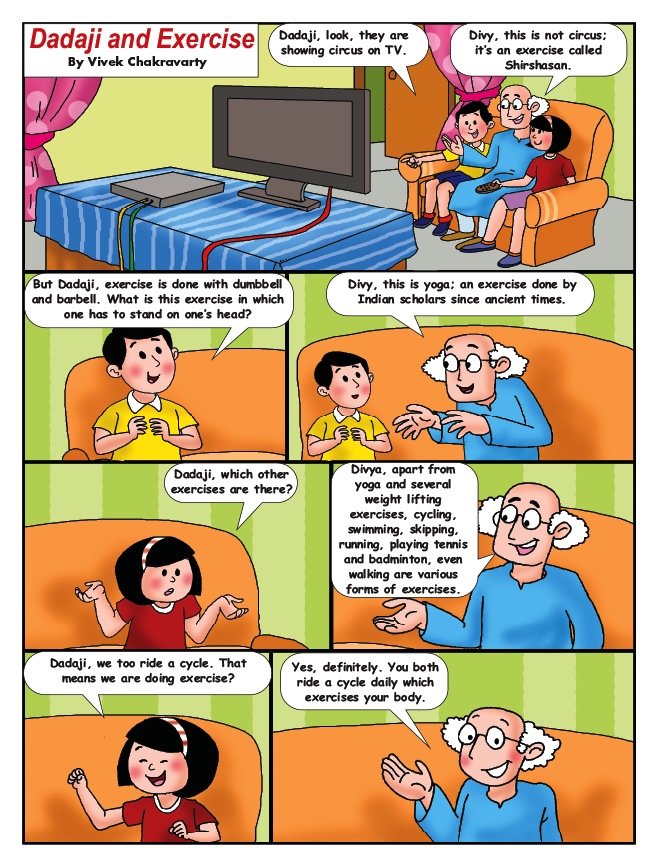
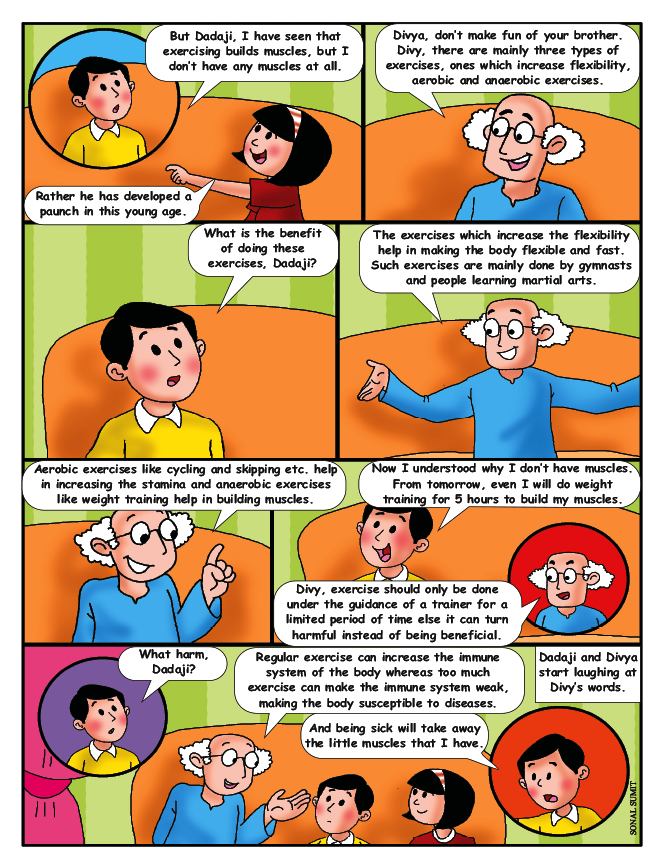
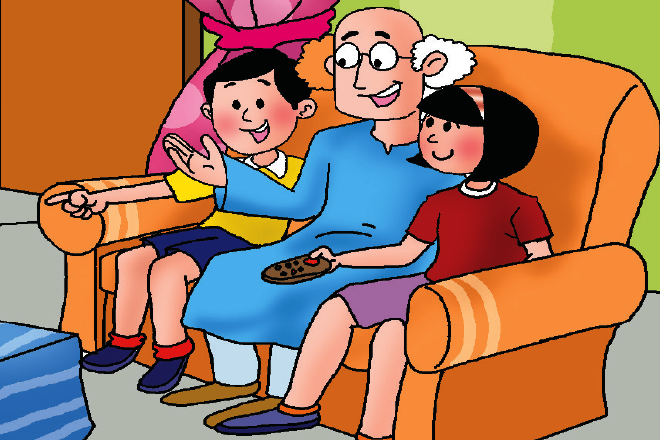



Penzance, England was a 17th century village situated near the sea. It was a small village covered with dense forests on all sides. There were huge mountains, valleys and mines at some distance from the village. The villagers worked in these mines and earned their living.
Little Sir Humphry Davy was a resident of this village. He was a pensive kid. He sat near the seashore and kept staring at the waves and slipped into deep thoughts. He had good analysing skills and was very imaginative. He had an eye for detail while his imagination was out of the box.
Sir Humphry Davy’s friends were always busy in playing and having fun, whereas Sir Humphry Davy kept himself busy in studying the mountains. Sometimes he tasted the seawater and wondered why it is salty. “What in the sea water gives it a salty taste?” he thought. He often smelt the gases coming out of the stove and tried to find out what effect those gases have on human body.
Sir Humphry Davy was keen on studying nature more than his studies. He studied the trees, birds, animals, wildlife, sky, mountains, and stones. He also made notes in his diary.
One day, Sir Humphry Davy drew a picture of a strange lamp in his notebook. It was an oil lamp that was covered by a mesh of olive branches.
“How foolish is this!” said his friend looking at the picture, “If you make a web of olive branches, they will get burnt.”
“And the web will decrease the brightness of light. What is the use of designing a lamp that doesn’t provide adequate light?” added another friend.
“Now please stop drawing such useless pictures and come out to play with us,” insisted his friends.
Sir Humphry Davy replied, “I am sorry. I won’t be able to join you. I have bought a book on chemistry from the library. I have planned to read the entire book today.”
Sir Humphry Davy began to read the book with utmost interest. He also conducted some minor experiments.
He did not have sufficient resources. Hence he managed with whatever little he had. He used his kitchen stove as the laboratory burner to conduct heating experiments. He used to get so engrossed with his work that he often forgot to have meals. Sometimes he stayed up all night working.
When Sir Humphry Davy became an adult, he developed interest in a new kind of gas. He found a gas which would make one laugh hysterically when one smelt it. Scientists believed that it was a poisonous gas and was fatal to human beings as well as animals.
Sir Humphry Davy was brave and curious. He repeatedly smelt the gas a number of times, and hence proved that it is not a fatal gas and can be put to use for beneficial purposes.

The chemical name of that gas was nitrous oxide. It is also known as ‘Laughing gas’. It is known to reduce the sensation of pain. Medical practitioners soon accepted Sir Humphry Davy’s research, and stated using the laughing gas prior to surgeries. It helped in easing the pain sensation in patients. Sir Humphry Davy became famous all over owing to his research.
Sir Humphry Davy now started his research on electricity. He found that if light energy is passed through water, the latter splits into hydrogen and oxygen. He passed light through various acids, solutions and mixtures. He noticed several chemical changes taking place in the mixtures. This was known as electrolysis of water.
Sir Humphry Davy also extracted salt from the sea and studied it. He discovered two elements called sodium and potassium from the salt.
Sodium is a very active salt. It catches fire when it comes in contact with water. Hence sodium is always kept immersed in oil. The discovery of sodium and potassium was another feather in Sir Humphry Davy’s cap.
During those times, people had to frequently face explosions in mines. The primary reason for these explosions were combustible gases called Firedamp, one of which is methane. These gases accumulated in large amounts in those mines. People had to light lamps to get rid of the darkness in the mines. This lighting of the lamp and the presence of damp gases caused the mine explosion. Many people lost their lives due to these explosions.

Sir Humphry Davy started studying the combustible gases in the year 1815. He found that damp gases required a lot of air and high temperature in order to catch fire. He also found that these gases cannot catch fire in a metal pipe as the metal reduces the surrounding temperature. Sir Humphry Davy thus invented a safety lamp based on this principle.
He made a thick elemental mesh around the lamp. The lamp emitted bright light inside the mine. The metal framework lowered the temperature, eliminating the risk of an explosion. This discovery of Sir Humphry Davy was considered no less than a miracle. In this manner, the lamp allowed miners to work safely in the presence of combustible gases. This lamp was named as ‘Davy’s Safety Lamp’.
This lamp looked exactly like the one Sir Humphry Davy had drawn in his childhood, and his friends had made fun of it. The only difference was that this lamp had a metal framework as opposed to lamps made up of olive branches.

With all of his discoveries and inventions, Sir Humphry Davy proved that imagination is useful and is a gateway to reality.
One can manifest his imagination into reality if he works hard and is dedicated. And thus one can aid in the betterment of mankind.
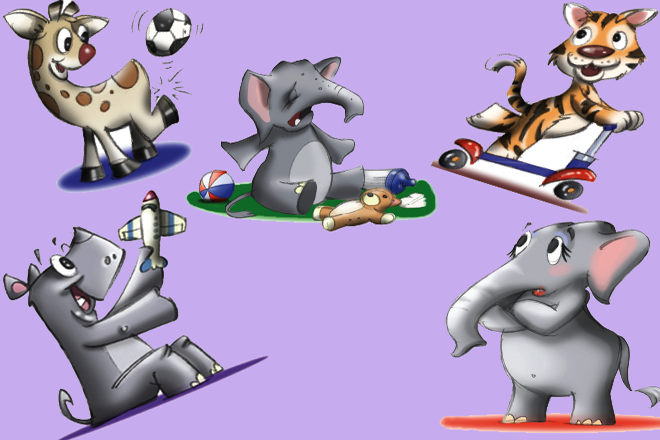
From generations, Himba elephant’s family had won the ‘Happy Baby Contest. All the babies born in this family had a well-balanced body, with correct height and weight. They were healthy and happy.
Therefore, all the babies in Himba elephant’s family used to easily win the competition every year easily defeating all the other babies of the jungle.
This time, it was Timba’s turn to take part in the competition. Timba was only six years old. He could hardly walk properly. Recently, he had been weaned off milk and had started eating various types of grasses.
Timba’s mother was upset. Her baby, though eligible, wasn’t the only one capable of winning the ‘Happy Baby Contest. There were many babies participating in this competition!
A giraffe baby, a tiger baby and a rhino baby were some of the strong contenders. They appeared to be happy and healthy. They were also active and mischievous.
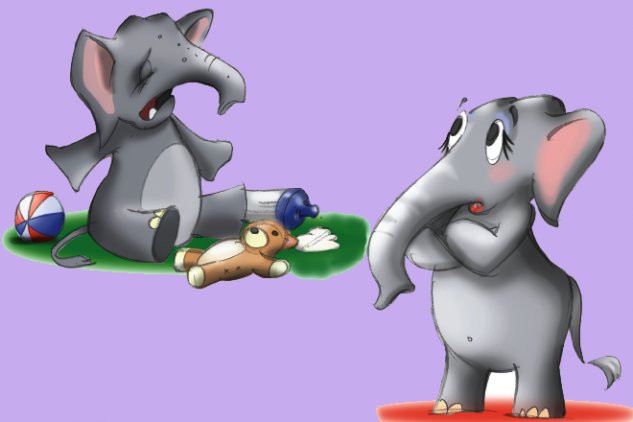
As the competition date approached, Timba’s mother started taking special care of her baby. She started cooking food that Timba liked.
She paid special attention to his sleep and exercise habits. In spite of all these efforts, Timba became dull. He used to cry over small things and throw tantrums.
Timba’s mother was worried. She went to meet their family’s oldest grandmother; who had been a healthy baby contest winner in her childhood.
Grandma lived in another part of the jungle with her maternal family. It was near a pond.
Mother said, “Grandma, I am very worried about Timba. He has to participate in the ‘Happy Baby Contest’ next month.
However, he looks so sad and is inactive. What should I do to make him active and happy?”
Grandma consoled Timba’s mother by saying, “You don’t have to worry about your child. He will perform well. I am sure he will win.”
She added, “There is still some time left for the competition. Why don’t you let Timba stay with me for a few days?”
Timba’s mother was relieved to hear this. She had great faith in Grandma.
The next day, Timba’s mother told her son, “Good news! Your Grandma, who is also a part of the Himba family, has been remembering you. She wants you to go and stay with her for some days.”
Hearing this, Timba nodded his head reluctantly.
Next day, Mother took him to meet Grandma. Grandma was a patient elephant. She smiled and hugged Timba.
She lovingly exclaimed, “Little Timba! I am very happy to see you. I want you to stay with me for a few days, so that I can get to know you better.”
Timba looked at her and smiled. He decided to stay. The next morning, when Timba woke up, Grandma said, “Timba, let’s go for a walk.”
He was in no mood to walk but could not say this to his Grandma.
He muttered, “Okay Grandma!” and got ready quickly.
As they started walking, they came across a lot of animals. Grandma being a happy person, greeted by nodding her head or waving her trunk. She was very popular with everyone in the jungle.
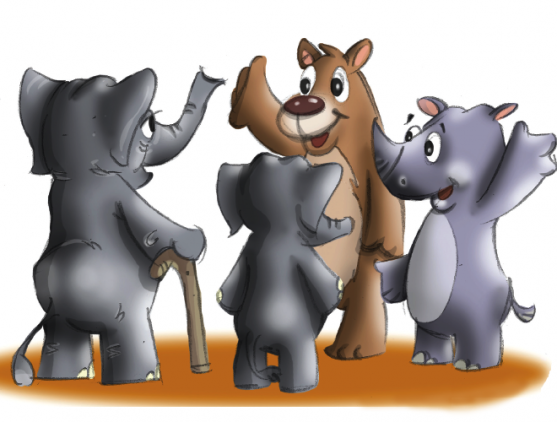
Timba observed how she behaved. He realised that he was growing very fond of his Grandma.
For a few days, Grandma didn’t say anything to Timba.
Timba had started liking his morning walks with Grandma. He looked forward to them. He also started saying hello to everyone. In fact, he was smiling all day!
Just before the last day of his visit, Timba asked Grandma, “Grandma, How can you be so happy and so friendly with everyone? I have a few friends who don’t talk to me. Some of the others even tease me and call me fatso.”
Grandma replied, “Animals may say anything. However, when we are friendly and confident of ourselves, they will always respect us. When we smile, they will smile in return. If you respect others, they will always do the same.”
Hearing this, Timba became very thoughtful. The next day he returned to his mother. His attitude had changed completely. He began to greet everyone just like his Grandma. In turn, everyone returned the greetings. Everyone was becoming fond of Timba baby!

Needless to say, Timba won the ‘Happy Baby Contest. And he remained a happy and a healthy elephant.
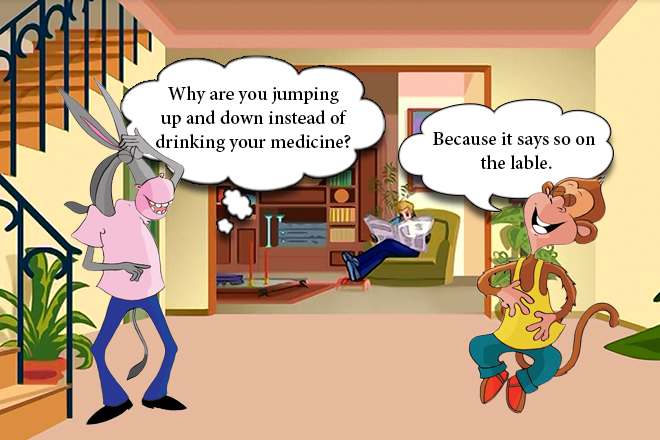
Damru: Why are you jumping up and down instead of drinking your medicine?
Jumpy: Because it says so on the lable.
______________________
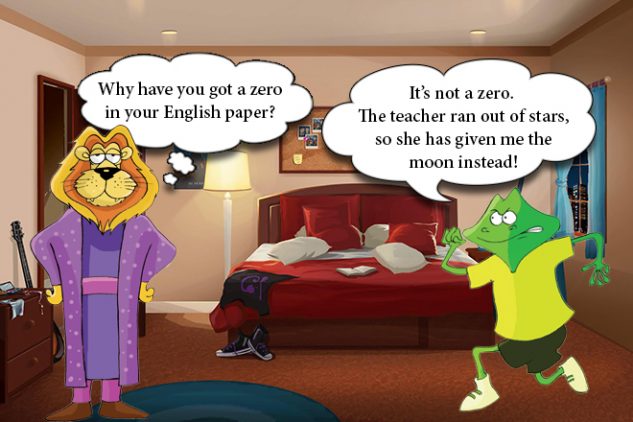
Sher Singh: Why have you got a zero in your English paper?
Franky Frog: It’s not a zero. The teacher ran out of stars so she has given me the moon instead!
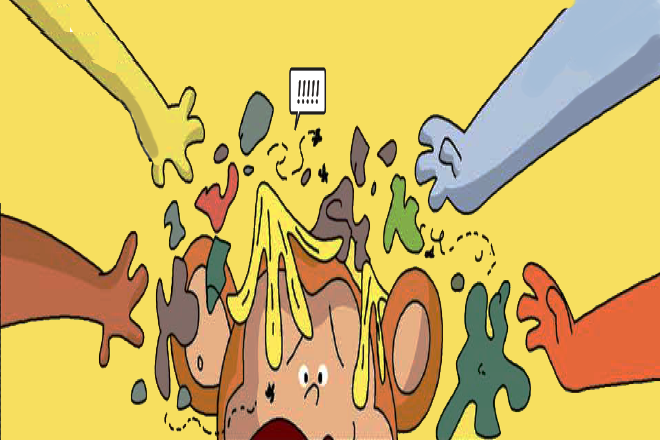
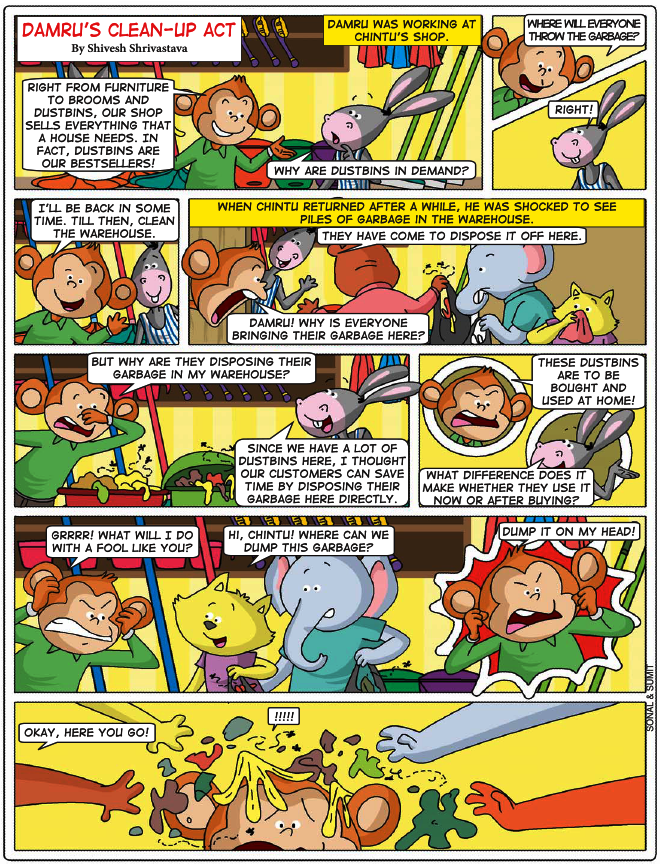
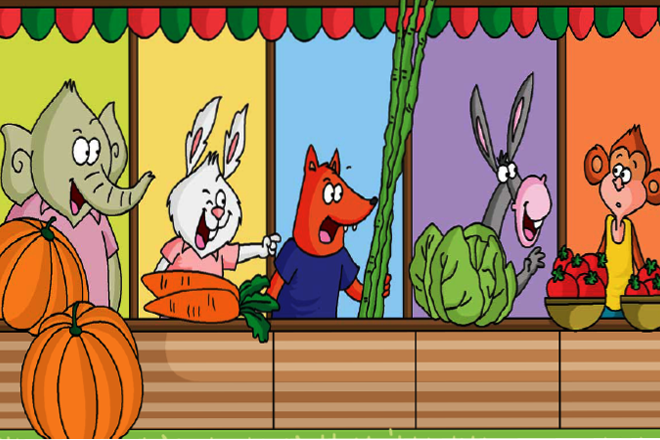
Champakvan was abuzz with excitement. All the animals had been working hard for months preparing for the Champakvan Annual Vegetable Competition. Finally, the day arrived when their farm produce would be judged and the “Best Vegetable” award would be announced.
As always, King Shersingh lion and Prime Minister Blacky bear were the judges. The participants eagerly awaited their turn to present the ‘vegetable of their labour.
There were giant pumpkins, enormous cabbages, huge carrots and tall drumsticks. Cheeku rabbit, Damru donkey, Jumbo elephant and Baddy fox stood proudly next to their exhibits. Next to these eye-catching displays was Jumpy monkey’s small stall with a basket of regular-sized tomatoes. The other animals could not control their amusement at seeing Jumpy’s poor display. They were sure that Jumpy would not even qualify for the competition.
“I am sure to win this competition. Look at the size of my pumpkin,” said Jumbo proudly.
“Don’t be so confident. My carrots shine like gold,” said Cheeku.
“Yes. But we all know who isn’t winning the competition this time,” said Baddy, looking at Jumpy.
“Jumpy, don’t forget to get your participation certificate before you leave,” said Damru.
Everybody laughed. Jumpy did not respond to the comments. He continued to quietly wait for his turn to be judged.
Meanwhile, Shersingh and Blacky visited each participant’s stall. They tasted each vegetable and asked questions about how the vegetables were grown and made notes about them.
“Look at the size of that pumpkin!” exclaimed Shersingh, surveying Jumbo’s display.
“So, how did you grow it, Jumbo?” asked Blacky.
“The secret to its growth is the use of pesticide,” said Jumbo. “I sprayed a good amount of it to kill all the worms. Then I removed chunks of soil to build a solid cement platform on which I placed the pumpkin so that it could continue to grow on a clean base.”
Next, it was Cheeku’s turn. “My gigantic, shiny carrots are the result of a special chemical spray that prevented the caterpillars and earthworms from getting anywhere near my vegetable patch. I also removed all the other plants that grew around the carrot patch, to make a place for those plants to grow without any competition.”
Baddy and Damru too explained how they used special chemicals to make their vegetables grow.
Baddy even diverted water from the stream to his garden to make sure his vegetables were always watered.
Finally, it was Jumpy’s turn. The judges tasted the tomatoes and were surprised at how tasty they were.
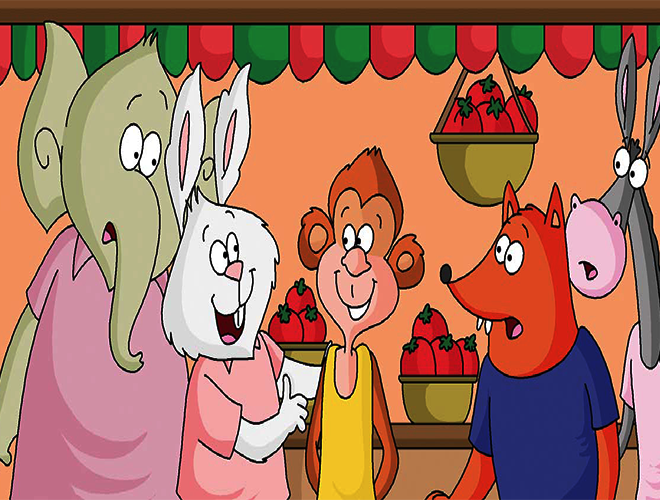
“Wow! Your tomatoes are so tasty!” said Shersingh. “What chemicals did you use?”
“Thank you, Sir. I did not use any chemicals at all,” said Jumpy.
Everyone was surprised. “Then, how did you manage to grow such tasty tomatoes?” asked Blacky.
“I began by tending to the soil using what I call the ‘three-step magic plan’. First, I dug a shallow pit, planted the tomato seeds and then watered them. This shallow pit held the water within it,
so the seeds had adequate water and there was no wastage of soil because the water wouldn’t run. Then, I planted lots of other plants around the tomato patchplants that would not compete with the tomato plants for the same nutrition. These plants made sure that the soil was not blown away by the wind,” said Jumpy.
Jumpy continued, “And lastly, I added bio-degradable waste, like vegetable peels and fruit pulp, to the soil to act as organic fertiliser and improve the quality of the soil. This is what made the tomatoes tasty.”
Shersingh and Blacky were impressed by Jumpy’s ‘three-step magic plan’ that was simple yet effective.
After a round of discussion with Blacky, Shersingh announced the winner of the Annual Vegetable Competition.
“I am proud to declare Jumpy as the winner of this year’s contest!” announced Shersingh. “Moreover, I also request all animals to hereby follow his ‘three-step magic plan’ while growing their fruits and vegetables.”
Jumpy was ecstatic. The other animals were puzzled.
“But his tomatoes were so small and dulllooking!” whined Jumbo.
“And what’s so special about his so-called magic plan?” asked Baddy.
“His tomatoes may be small but they were the tastiest of all the vegetables I tasted today. They were fresh and free of any chemicals, too. His magic plan is not about magic but about being environmentally conscious while growing plants. His method enriched the soil, did not waste water and did not kill the earthworms,” said Shersingh.
“Of what use are earthworms? They are just pests,” said Cheeku.
On the contrary, earthworms are extremely useful for your plants. They loosen up the soil, which helps increase the amount of air and water that gets into it. They also break down organic waste, like leaves and vegetable peels, into a form that the plants can use,” explained Shersingh.
The animals now realised why Jumpy was declared the winner. They went up to him to congratulate him.
“Congratulations, Jumpy! Your win was well deserved,” said Cheeku.
“Yes, it was. And we have also learnt how we can also grow vegetables and fruits without causing harm to the environment and wasting resources,” said Jumbo.
“We want to apologise for making fun of you earlier,” said Baddy.
“Thank you, friends. I am happy that you have learnt that it is not the size and appearance of the vegetable but how it is grown that matters,” said Jumpy.
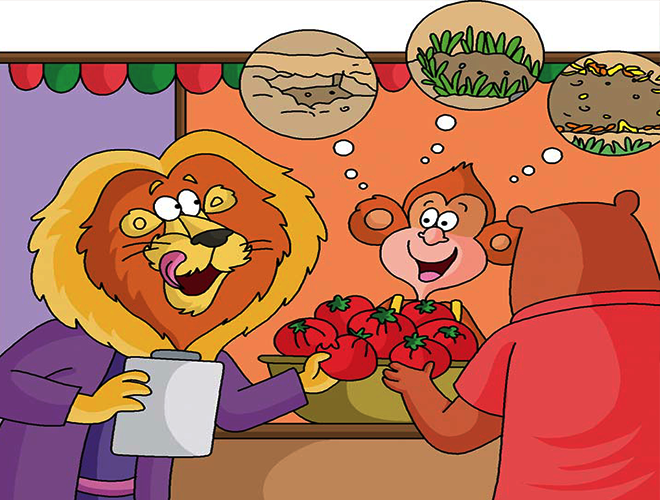
“Could you help us with our farming? Our vegetables would be much better if we followed your method,” said Damru.
“Of course! I would love to help you all,” said a beaming Jumpy.
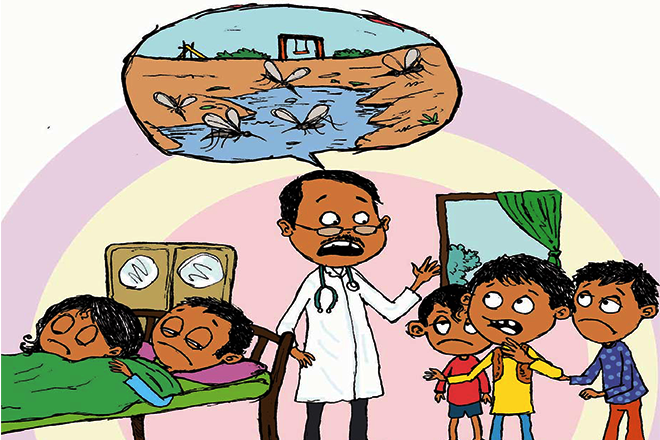
Neel and his friends were waiting for siblings Jay and Khushi to join them at the colony park. After waiting a while, the kids decided to go to their house to call them.
When Neel knocked on the door, the siblings’ mother, Reena aunty opened the door and invited them in. Inside, they saw Jay and Khushi lying on the bed while being attended to by the neighbourhood physician, Dr. Kumar.
“What happened to them, Aunty?” asked Neel concerned.
“They fell ill after they came home from the park last evening,” replied Reena aunty.
“Do you know why they fell ill?” Dr. Kumar asked the kids. “It is because of the lack of cleanliness in your society, especially in the park where you play. There is garbage everywhere, old tyres and plastic bottles are discarded in the park. It is the perfect environment for germs to thrive.”
“You are right, Dr. Kumar. Also, water gets collected in the puddles, as well as, inside the discarded tyres and coconut shells where mosquitos breed,” said Reena aunty.
“Mosquitos are the main transmitters of diseases such as dengue and malaria. You kids should stay away from the park,” advised Dr. Kumar.
In the evening, Neel told his father about Dr. Kumar’s advice against playing in the park.
“But Dad, the park is the only open space we have to play in. If we cannot play there, where else can we go?” asked Neel.
“Our society has a committee that is supposed to look into these issues but no one seems to have the time. Only if someone comes forward and starts something, will everyone else join. That is the problem,” said Neel’s father.
Next day, after school, Neel and his friends met to discuss the situation.
“Since the adults don’t seem to have the time, it is up to us to do something to clean up our society. Otherwise, we will not be able to play without our parents worrying about us falling ill,” said Neel.
“You are right. Let’s first start by clearing the scrap materials lying around. I will ask my mother to call up the scrap vendor who comes to our house to collect the old newspapers and bottles,” suggested Nina.
“That’s a good idea. Meanwhile, we will talk to the committee and get their permission,” said Neel.
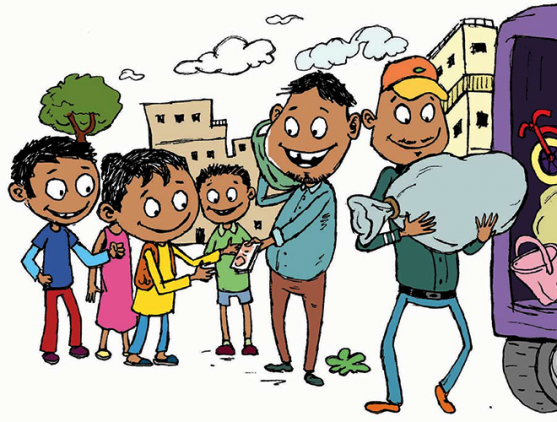
The kids met the following evening and sold all the scrap material to the vendor.
“We got a good amount of money from selling all that scrap. But this may not be enough to continue with our plan,” said Kevin.
So, the kids decided to pool their pocket money and the savings from their piggy banks.
The money the kids had collected was insufficient to cover all the expenses, but Jay’s father was impressed by their initiative and agreed to contribute some money. A few other parents came forward to contribute money as well.
Soon, the work was underway in the neighbourhood. Within a few days, the work was completed.
That Sunday, the residents of the colony woke up to a cleaner neighbourhood. The roads were fixed, the pavement was cleaned, there were dustbins placed every few metres and signs asking the residents to keep the society clean were put up. Though the residents knew that the kids had been working on cleaning up the society, they were pleasantly surprised by the results.
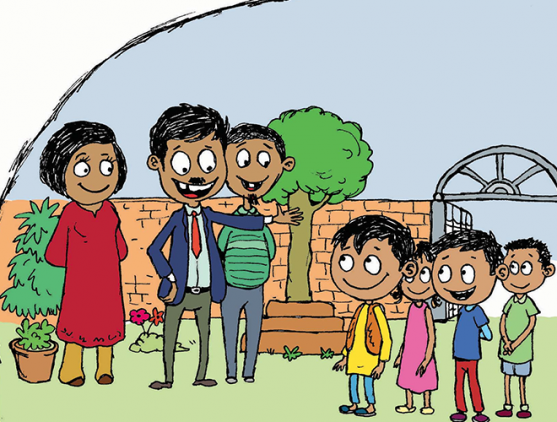
In the evening, the committee convened a meeting and appreciated all the kids.
They also promised to take efforts to upkeep the cleanliness. The kids were happy that their efforts had paid off, more so because they could now play in the park without worrying about falling ill.
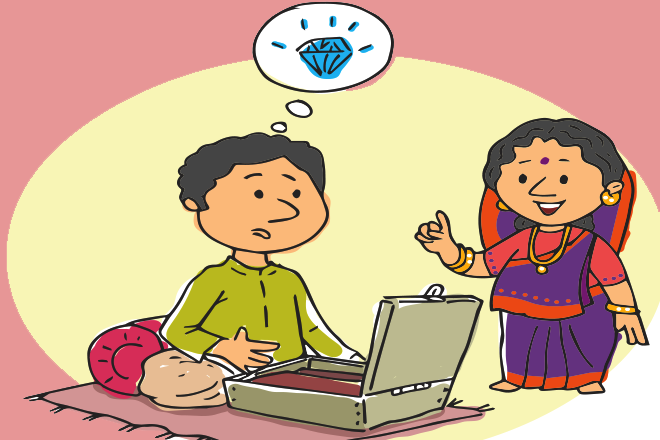
The kingdom of Rajpur was ruled by King Aditya Prathap Singh. He was a wise and just ruler who took care of his people. The citizens of Rajpur respected King Aditya and looked up to him.
A wealthy merchant named Gopal and his wife Meena were known to be a kind and generous couple in the kingdom.
One day, Gopal and Meena had to travel out of town urgently. Gopal was worried about the safety of a diamond that had been in his family for generations.
“We cannot leave the diamond behind at home. What if someone breaks in and steals it?” said Meena.
“But who do we leave it with? The person has to be trustworthy,” said Gopal.
“Our neighbour Sumesh is a good person and he is your friend as well. He is one man we can trust the diamond with,” said Meena.
“You are right. In all the years that I have known him, he has only been nice and helpful to us,” agreed Gopal.
Gopal placed the diamond in a small red pouch and carried it along to Sumesh’s house.
“Sumesh, will you please do me a favour?” asked Gopal. “Anything for you, my friend. Just name it,” said Sumesh.
“My wife and I are going out of town to visit my aunt who is unwell. We may be gone for a couple of weeks. Could you please keep this diamond with you for safekeeping? As you know, this is my ancestral property and you are the only one I can trust it with,” said Gopal.
“Don’t worry, Gopal. I will keep your diamond safe. I will guard it with my life,” assured Sumesh. “Thank you, Sumesh!” said Gopal.
A couple of weeks later, Gopal and his wife Meena returned to Rajpur. Gopal went to Sumesh’s house to collect his diamond.
“Come in, Gopal. How is your aunt’health?” enquired Sumesh.
“She is feeling much better now. Thank you,” replied Gopal.
“Good! So, tell me, what brings you here?” asked Sumesh.
“I have come to take my diamond back. Thank you for taking care of it in my absence,” said Gopal.
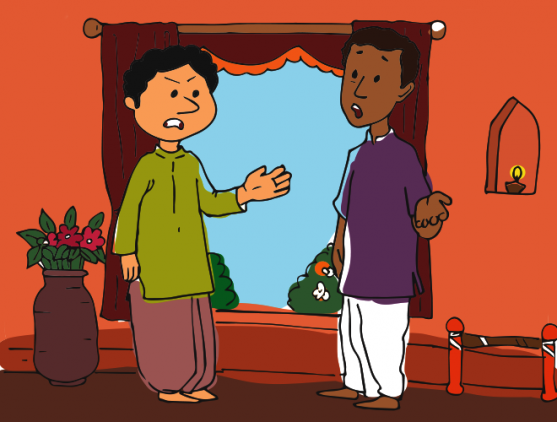
“What diamond? What are you talking about?” said a surprised Sumesh.
“The diamond that I had entrusted to you the day before I left town,” said Gopal.
“You are mistaken, my friend. You did not give me any diamond. You asked me to take care of your house, which I did,” said Sumesh.
It struck Gopal that Sumesh was cheating him by lying about the diamond. Before Sumesh could stop him, Gopal ran towards “King Aditya will decide who is telling the truth and who is lying. Come with me to the court,” said Gopal.
“Yes, let him decide. Come on, let’s go,” said Sumesh confidently.
At the court, Gopal and Sumesh narrated their sides of the story. King Aditya listened to them attentively. After much thought, he said, “I will give you my decision after three days. Till then, this diamond shall remain in my custody.”
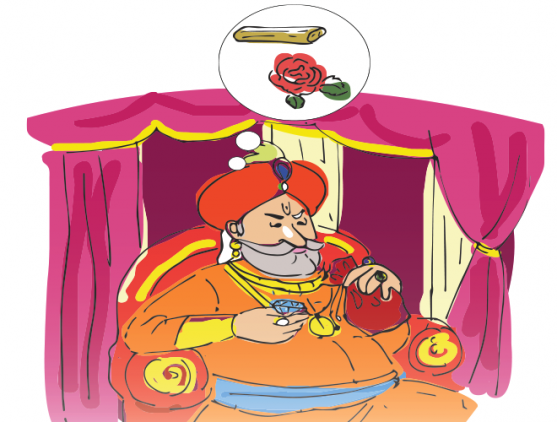
That night, King Aditya took the diamond out of the pouch and began to wonder who was telling the truth. As he was fiddling with it, he noticed that the diamond had a nice fragrance.
“What a nice smell! Smells like sandal and rose,” King Aditya thought to himself. He smelled the bag in which the diamond was kept, and it had the same fragrance. Just then, he had an idea.
Next morning, King Aditya disguised himself and went over to Sumesh’s house.
“Sir, I am a special officer sent by the King to investigate the diamond case Could you please tell me your side of the story?” requested King Aditya.
“Of course, Sir. I bought the diamond from the jeweller three days ago by paying 5000 gold coins from my savings. But that greedy Gopal wants to steal my diamond. If you don’t believe me, you can ask the jeweller,” said Sumesh.
With Sumesh’s permission, King Aditya searched the house but he did not find anything that could explain the fragrance on the diamond. He then left for Gopal’s house.
“Sir, I am a special officer assigned to this case. Can you tell me about the diamond that you claim is yours?” King Aditya asked Gopal.
“I don’t know where the diamond is from because it has been in my family for generations. Before my father passed away, he gave me the diamond in a box and asked me to keep it safe. But I have failed to do so,” said Gopal sadly.
“Can I see the box that your father had given you?” asked King Aditya.
Gopal handed him the box.
King Aditya could immediately make out that the box was made of sandalwood and had the same smell as that of the diamond. He opened the box and found a few dried rose petals in it. Everything made sense now.
“May I keep this box?” asked King Aditya
“Yes, sir. You may,” said Gopal.
After assuring Gopal that justice would be done, King Aditya left for the palace.
On the day of judgement, Gopal and Sumesh were present in the court, besides the jeweller and some members of the public. Everyone was sure that Sumesh was innocent as he had the jeweller to testify his claim, while Gopal had no witnesses.
“I have come to the conclusion that the diamond belongs to Gopal. Sumesh is the liar!” announced King Aditya.
Everyone, except Gopal, was shocked.
“But sir, how did you come to that conclusion?” asked one of the ministers.
“The diamond and the red pouch had the a fragrance of sandal and rose. When I had gone to both their homes, Gopal told me about the box in which he had kept the diamond. The box is made of sandalwood and there were rose petals inside it. This made it clear to me that Gopal was the real owner of the diamond, as I had not mentioned to him about the scent earlier,” explained Aditya.
Sumesh became scared and confessed to his misdeed.
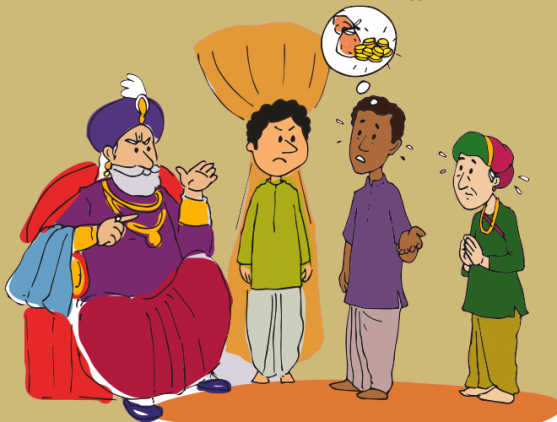
“Forgive me, Sir! I became greedy on seeing the diamond and came up with a plot to keep it with me. I bribed the jeweller with 300 gold coins to validate my story about buying the diamond from him. Please forgive me,” Sumesh pleaded.
“As punishment for your greed and breaking a person’s trust, I sentence you to one year in prison and levy a fine of 2000 gold coins. The jeweller too will pay a fine of 1000 gold coins,” ordered Aditya.
Everyone hailed the King’s decision. Gopal got back his precious diamond and went back home a happy man.
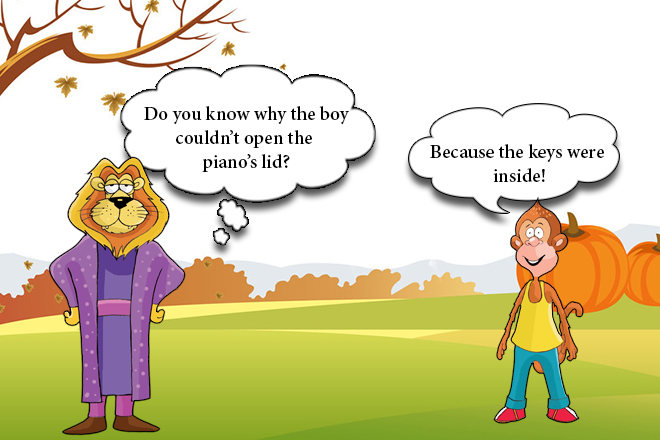
Sher Singh: Do you know why the boy couldn’t open the piano’s lid?
Jumpy Monkey: Because the keys were inside!
_____________________________________________
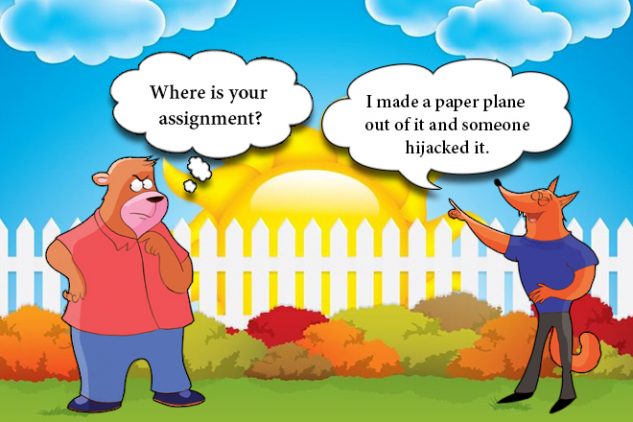
Blacky Bear: Where is your assignment?
Foxy Fox: I made a paper plane out of it and someone hijacked it.

_______________
Mary had a little lamb, Little Lamb, Little Lamb,
Mary had a little lamb
its fleece was white as snow;
Everywhere that Mary went, Mary Went, Mary Went,
Everywhere that Mary went,
the lamb was sure to go.
It followed her to school one day, School One Day, School One Day,
It followed her to school one day
which was against the rule;
It made the children laugh and play, Laugh & Play, Laugh & Play,
It made the children laugh and play
to see a lamb at school
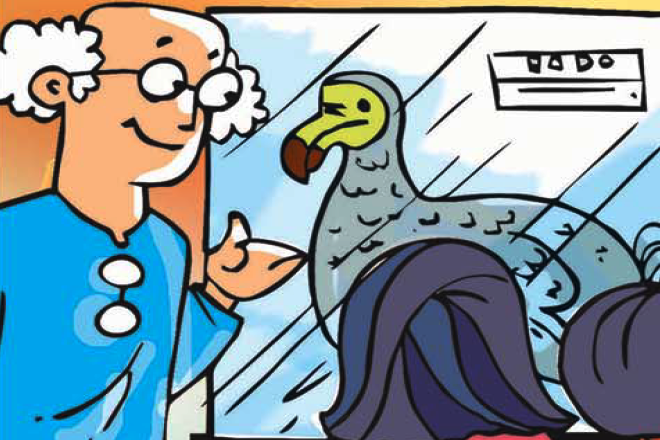
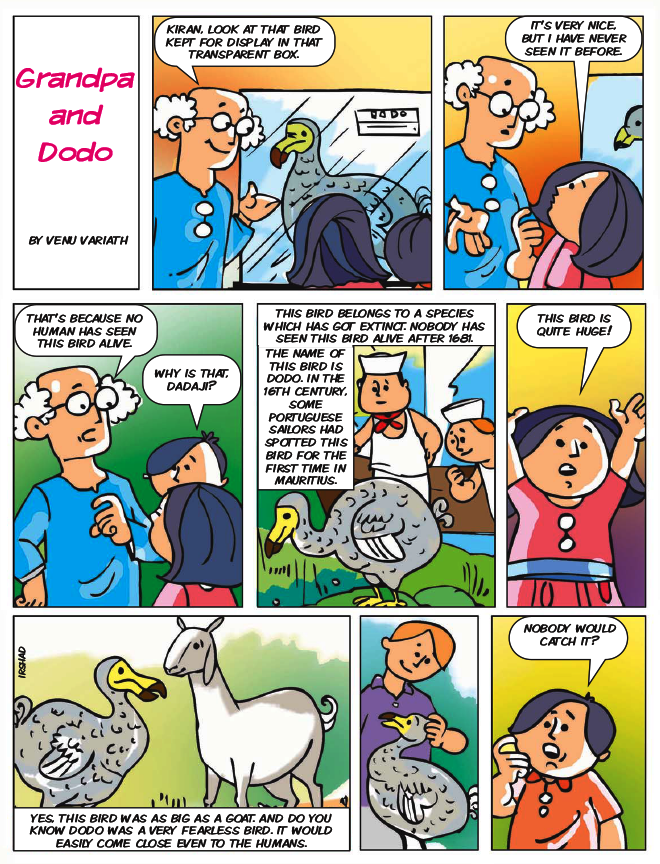
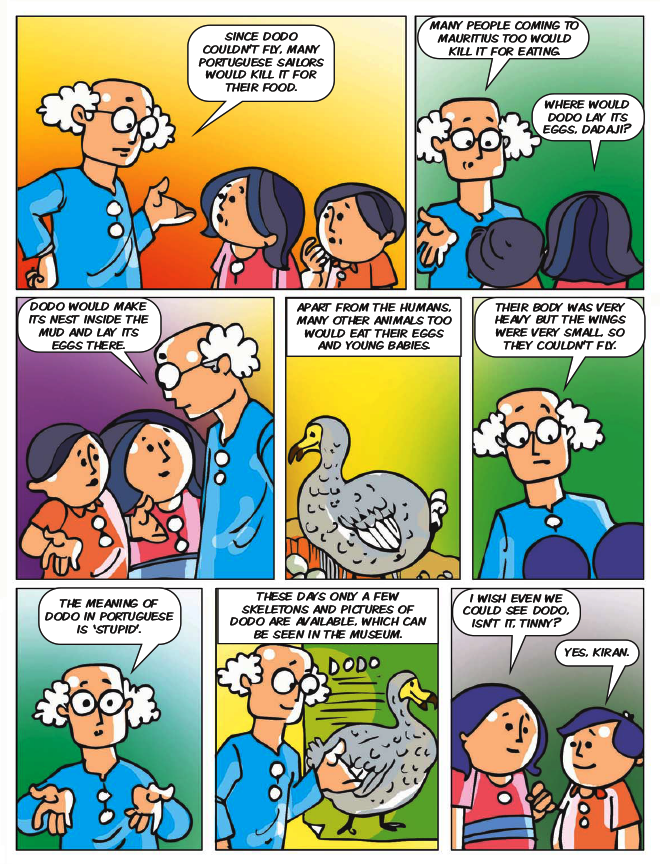
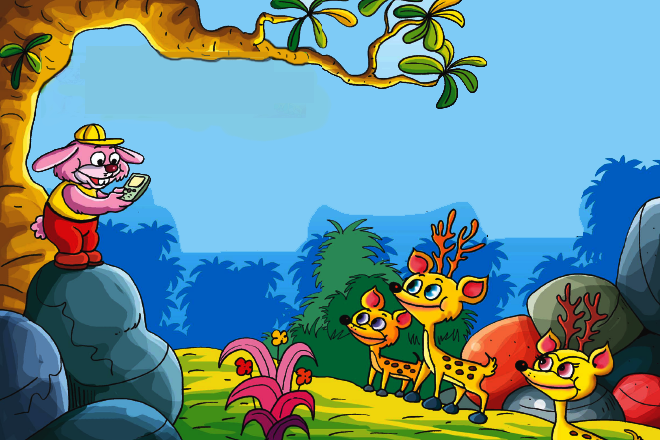
Roshni was a cute little rabbit who lived in Sundervan. She had been very excited of late. Well, Roshni was looking forward to her Uncle Roli’s visit, and was awaiting his arrival eagerly. Uncle Roli was her favourite uncle and worked in England.
Uncle Roli would bring many interesting and unusual gifts whenever he came to visit Roshni.
Roshni would show these gifts to her friends and classmates and feel very proud since no one had seen such things before. When Uncle Roli finally arrived, he gave Roshni a unique mobile phone as a present. It was pink in colour and there were pictures of pretty dolls engraved all over it. The mobile phone had a good collection of audio as well as video songs. The quality of the photographs and videos the phone took was very good too.
Roshni was fascinated by her new mobile phone. She spent hours listening to music and played games on it, instead of playing with the other children in the park. She even used it to click photographs and shoot videos.
And even though it was strictly forbidden, Roshni started carrying the mobile phone to school. She would use it in the lunch break to click photographs of her friends.
Everyone in Roshni’s class admired her new mobile phone and Roshni felt proud to own it. “May we borrow your mobile phone to click a photograph, Roshni?” some of her classmates would ask.
“May we listen to a song on it, or use it to make a video?” some others would request.
Roshni realised how fascinating her mobile phone seemed to everyone and she decided to take advantage of it.
“Alright,” she began to say. “But only in return for a favour.”
She would then ask her friends to buy her a chocolate bar or pastry for her, and often even get them to do her homework in return. Soon, Roshni began to behave like a pampered princess who enjoyed everyone’s attention and also the favours they showered on her.
Sadly, what she didn’t realise was that she was losing out on many important things. Since Roshni was no longer doing her homework on her own, she was losing touch with her lessons. And since she wasn’t going out to play, she was turning unhealthy. And since she was only letting the others use her mobile phone in return for a favour, she was gaining the reputation of being a snob. As a result, Roshni fared very badly in her exams. And when the results were out, she was terrified.
“I can’t let Mom and Dad see my low marks,” she said, worried about what her parents would say if they came across her report card.
One day, Roshni’s class went for a picnic to the banks of the Manmohini River. As usual, she started clicking photographs with her mobile phone.
Roshni’s friend Sneha Deer had brought a big bar of chocolate and a pair of pretty earrings. She had planned to give them to Roshni in return for clicking her photographs.
Roshni quietly pocketed the goodies and asked Sneha Deer to pose near a rock. She then went closer to the riverside to click a picture.
“Smile!” Roshni suggested as Sneha Deer posed. “Say ‘cheese!”
Suddenly, Roshni lost her balance and fell into the river.
“Help! Help!” she screamed.
The river currents were very strong and Roshni was afraid that she would drown.
Fortunately, Roshni’s classmates Appu Elephant and Lambu Giraffe were close by. They heard Roshni’s screams and jumped into the river.
Both Appu Elephant and Lambu Giraffe were good swimmers. In no time, they pulled Roshni out of the river.
Tweety Parrot saw Roshni’s mobile phone bobbing in the water. He flew to it quickly and picked it up just before it could sink. He then took it to Roshni.
Roshni’s class mates then arranged for some hot tea for Roshni to drink. Roshni felt grateful and thanked all her friends for helping her.
In the meanwhile, back at Roshni’s house, Mrs. Rabbit decided to clean Roshni’s room. She was dusting Roshni’s bag when she found the report card.
Mrs. Rabbit was extremely upset when she realised that Roshni had hidden the report card from her. And more so, when she saw Roshni’s low marks.
“Look at this!” she told Mr. Rabbit, sounding quite annoyed. “Roshni has fared badly in her exams. She has also kept her report card away from us.”
Just then the doorbell rang. It was the postman who had come with an envelope from the mobile company. Mrs. Rabbit opened it immediately and was shocked when she saw what was inside.’
It was a bill for a whopping amount of twelve hundred rupees for a month’s use of the mobile phone.
“I am going to have a word with Roshni as soon as she gets home!” Mrs. Rabbit decided immediately.
But when Roshni returned home, Mrs. Rabbit found that she was running a fever. Roshni explained how she had fallen into the river and was forced to wear wet clothes all day. Mrs. Rabbit immediately gave Roshni a spoonful of some very bitter tasting medicine and a tablet that Roshni found very hard to swallow. She then tucked Roshni in bed and put her to sleep.
Roshni slept very restlessly that night. “I do not want a mobile phone! I do not want a mobile phone!” she kept mumbling in her sleep. Mrs. Rabbit realised that Roshni had already learnt her lesson.
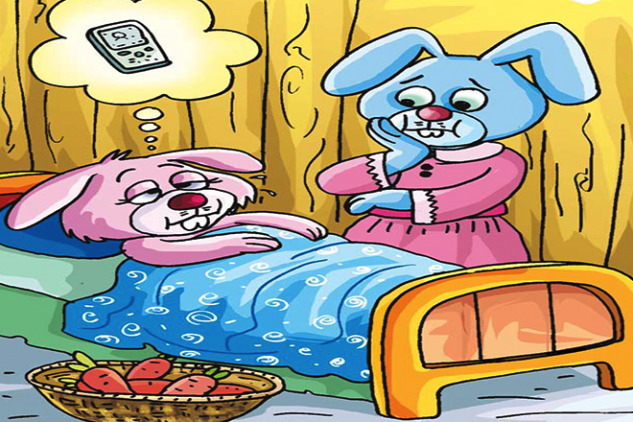
When Roshni was better after a few days, Mrs. Rabbit showed her the phone bill and the report card she had found.
She also brought it to Roshni’s notice of how unfair she had been to her friends by asking them to do her favours.
Roshni hung her head and apologised. She then handed her mobile phone over to her mother. The mobile phone had stopped working since it had been drenched with water.
Mr. Rabbit decided that he wouldn’t bother to repair the phone and simply threw it away.
Roshni missed her mobile phone for a few days. But after that, she began enjoying studying and playing outdoor games.
She worked extra hard for she realised that she had to score higher marks to make up for the marks she had lost in the first exam. She also apologised to her friends for having asked them for favours.
Roshni did very well in the next exam. And when Uncle Roli phoned to congratulate her, he asked her what she would like as a gift when he next came to visit.
“Oh Uncle Roli!” Roshni said. “Anything but a mobile phone!”
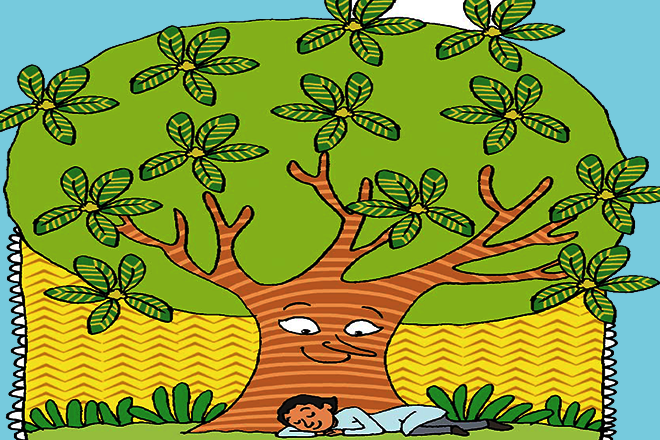
Ramji, the merchant, lived in the village of Karampur. Every day, he would travel to the nearby town on work. The path to the town led him through the forest, so he made sure to return to the village before dusk.
One day, while returning, Ramji stopped to take rest beneath a big mango tree in the forest. The cool shade of the tree and the gentle breeze slowly lulled him to sleep. After a short while, he woke up refreshed.
“I feel so fresh after that nap. I must do this every day,” he thought.
That day on, taking a short nap under the mango tree became a part of Ramji’s daily routine. He felt at home under the tree.
The mango tree, too, began to look forward to Ramji’s stopovers. It became happy whenever Ramji slept under its shade. On days when Ramji would be late, the tree would begin to worry. It would only relax after seeing him walk down the path towards it. This routine continued for several months. Soon, it was summer and the tree began to bear mango fruits. One day, as usual, when Ramji turned up to take rest under the tree, he noticed the ripe mangoes.
“I wish I could taste these mangoes! But I am too tired to climb the tree,” said Ramji to himself, eyeing the juicy fruits.
Almost as if the tree understood him, suddenly one big mango fell down. Ramji was surprised.
“Thank you, dear tree!” said Ramji, picking up the mango and taking a bite. “Wow! This is the tastiest mango I’ve ever eaten!” he exclaimed.
Once he finished eating, a few more mangoes fell from the tree. Ramji collected them in a bag and took them home to his family. He thanked the tree before leaving.
The mango tree was happy to see the delight on Ramji’s face.
Piku, the parrot, who lived on the mango tree, had been observing the friendship between the tree and Ramji.
“My dear friend, you were happy to let him sleep in your shade. But what was the need to give him so many mangoes?” asked Piku.
“He wanted to taste the mangoes, so I gave him some. Did you see how happy he was after eating the mangoes?” said the tree.
“You can’t trust these humans.
They are selfish,” warned Piku.
“You might be right but all humans are not the same. My friend Ramji is not selfish. He is a true friend,” said the mango tree with great conviction.
The following morning, the mango tree was happy to see Ramji arrive earlier than usual. He climbed the tree, plucked all the ripened mangoes, put them in a bag and went away without uttering a word.
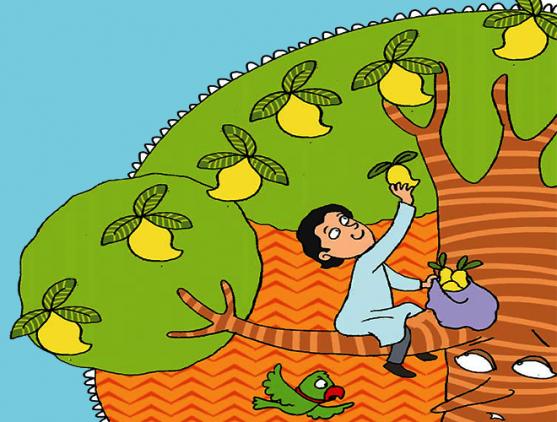
Piku laughed. “I told you humans are selfish. Ramji can never be your true friend,” he said.
The mango tree was disappointed with Ramji’s behaviour. It thought he would be different from the other humans. But Ramji continued to pluck the mangoes every day till there were none left. Though the tree was sad, it did not confess to Piku about it.
One day, when Ramji was on his way back from the town, he saw three men with axes standing near the mango tree. Ramji realised that the men were planning to cut down the tree. The mango tree hoped that Ramji would help; instead, he quietly walked away from there.
The mango tree was hurt. Piku’s words did not help comfort it.
“You were calling him your true friend but today, when you are in trouble, he vanished because you are of no use to him anymore!” said Piku.
The tree cried silently. It realised that its end was near. Coormamoonaan
The three men were preparing to cut down the mango tree. Before they could swing the axe, Ramji appeared with the forest department staff. The forest rangers stopped the men from cutting the tree and arrested them.
“That’s good, Ramji. In fact, all trees are our friends. We must not cut them down for our selfish motive,” said the ranger.
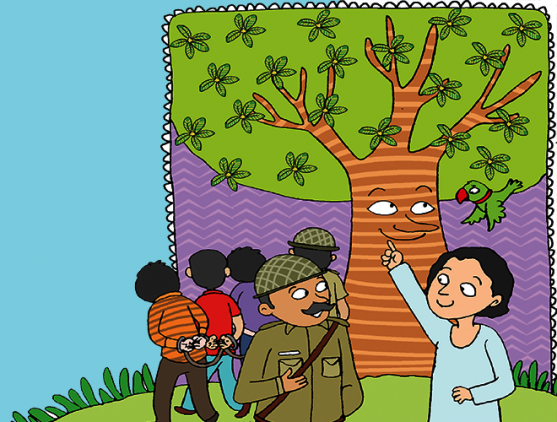
Ramji hugged the mango tree and said, “I will always be your friend.” The tree was elated.
After the humans left, the tree said to Piku, “Did you see that? You were wrong. Ramji is indeed a true friend.”
“Yes, I agree. I am happy to have been proven wrong,” said Piku smiling,
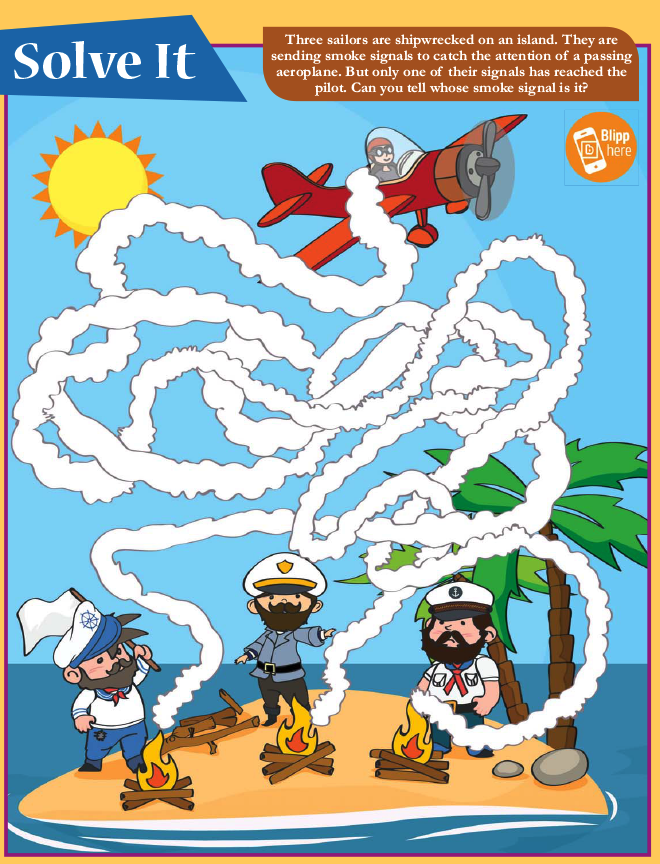
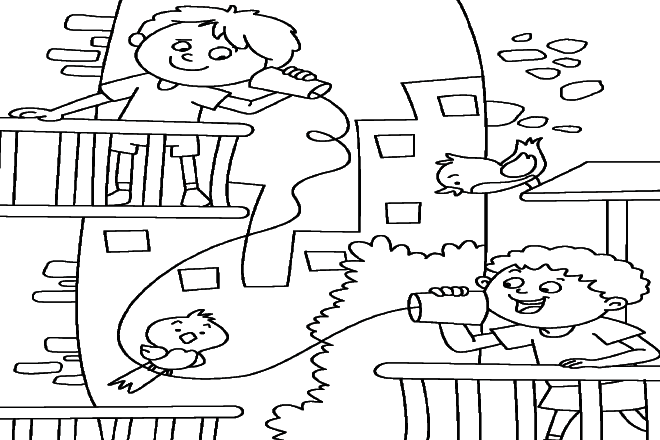
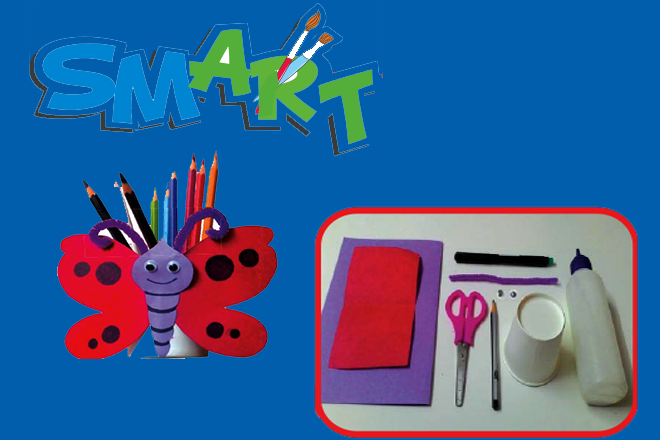
You will need:
Paper cup, colour papers, chenille stick, googly eyes, marker pen, pencil, glue and scissors.
How to make it:
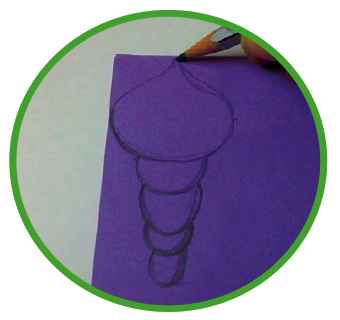
1. Draw an outline of the body of Titu butterfly on a colour paper and cut it out.
__________________________
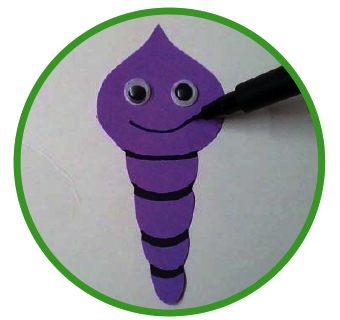
2. With the marker pen, draw details on the cutout as shown. Stick googly eyes.
__________________________
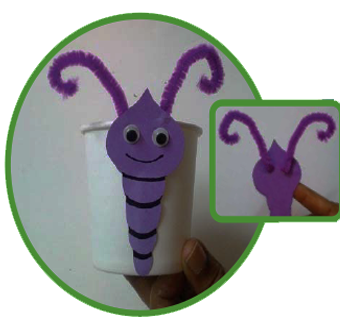
3. Cut the chenille stick into two, twist and glue them on the back of Titu’s head as shown. Stick the cutout to the paper cup.
__________________________
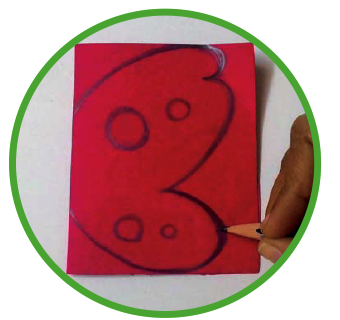
4. Take another colour paper and fold it in half. Draw one half of Titu’s wings and cut it to get two wings.
__________________________
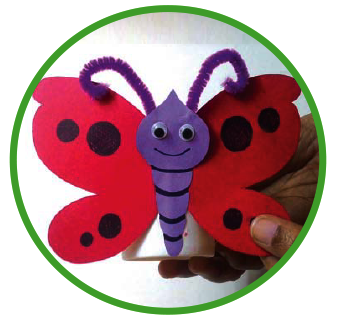
5. Add details to the wings using the marker pen. Stick them to the cup behind Titu’s body as shown.
__________________________
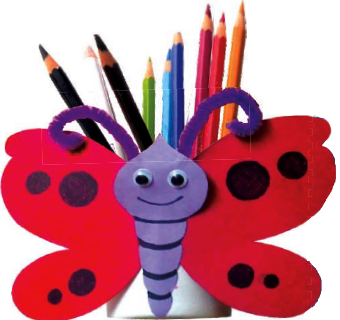
Your Titu pen stand is ready!
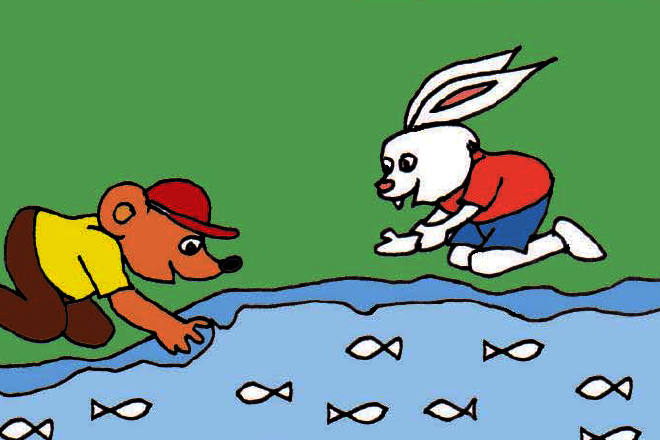
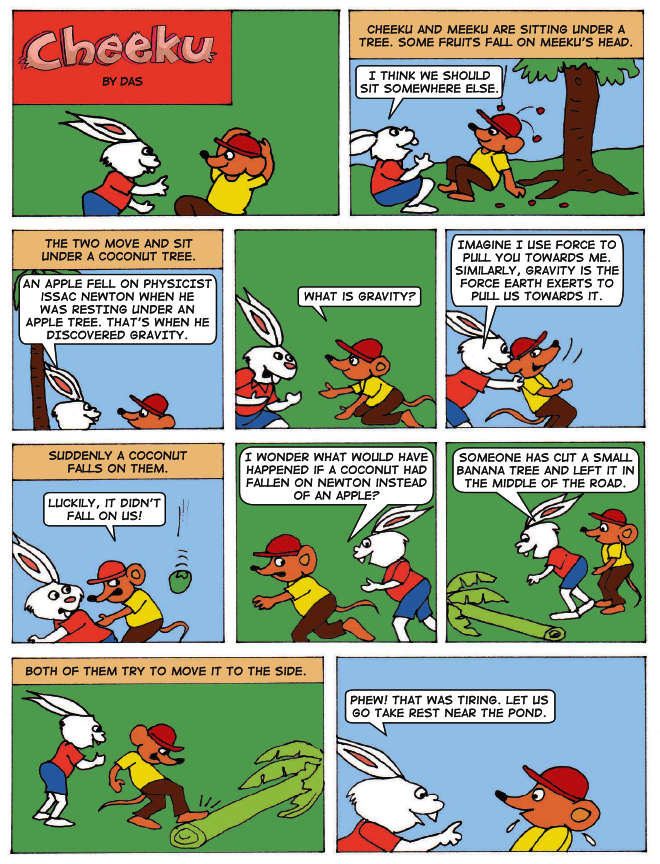
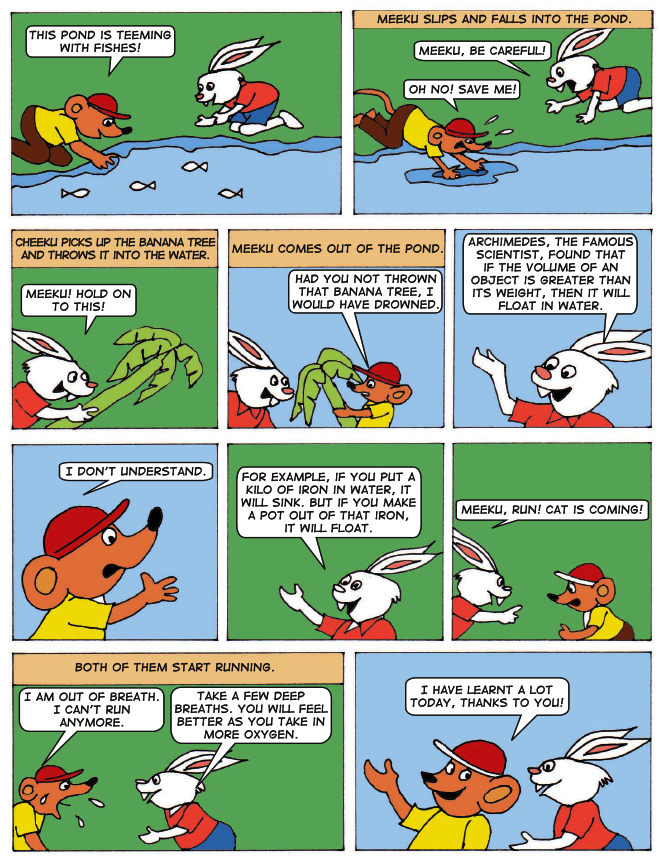
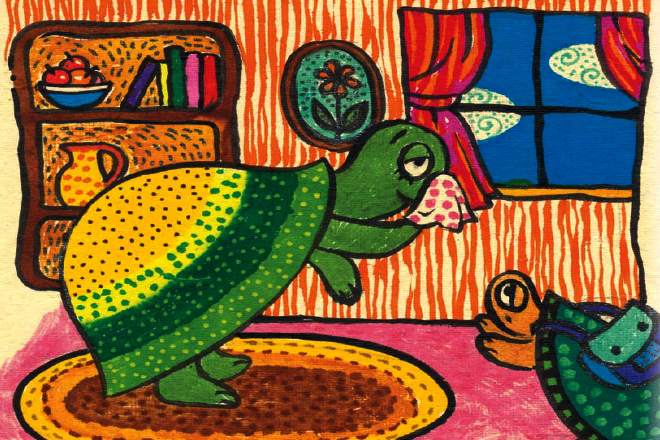
Tony was a naughty tortoise. He was well known in the forest of Sunshine Woods for his mischief.
“We receive so many complaints about your behaviour, Tony. When will you learn to be more responsible?” Tony’s father asked him, one day.
“Your teachers tell me that you are careless and don’t pay attention in school,” added his mother.
“I am sorry. I will try to be more responsible hereafter,” said Tony.
“Good. You can start trying right away. I am going out of town for a week. So, I want you to help your mother take care of the house,” said his father. Tony nodded his head.
A few days later, when Tony returned from school, he saw his mother sneezing continuously.
Achoo! Achoo!
“What happened, Mom? Are you unwell?” asked Tony concerned.
“Yes, son. Since morning I have been feeling tired and slightly giddy, too,” his mother managed to reply between sneezes.
Tony helped his mother lie down on the bed.
He placed his hand on her forehead to check her temperature.
“Oh no! She is burning!” exclaimed Tony.
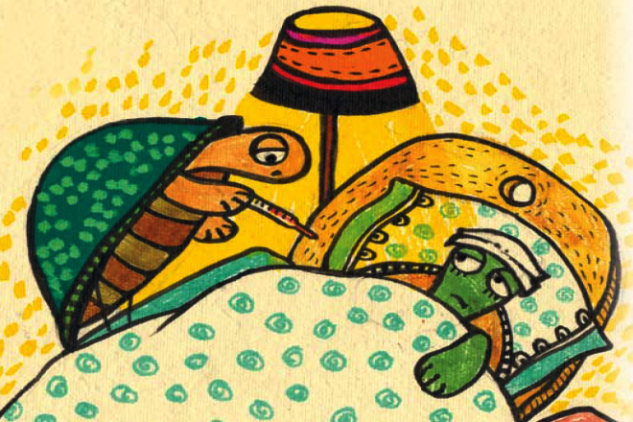
He took out the thermometer from the first-aid box and checked her temperature.
“102 degrees! That is not good,” thought Tony. His mother was now shivering, too. So, he covered her with a blanket and wondered what to do.
Tony remembered the first-aid workshop that was organised in his school recently. Paramedic Giro, the giraffe had demonstrated what the kids could do in different situations like fainting and dehydration, till help arrived. For high fever, Giro showed the kids how a wet cloth could be placed on the person’s head, and advised them to change it every few minutes.
As demonstrated at the workshop, Tony folded a handkerchief into a long strip and dipped it in a bowl of water. He squeezed out the water and placed it on his mother’s forehead. He kept repeating it every few minutes for the next one hour. As the temperature dropped, his mother slowly drifted to sleep. Tony, too dozed off.
Tony woke up a couple of hours later to find his mother shivering again. He immediately placed the damp cloth over her forehead and ran out to get help.
Tony rushed to his neighbour Popo, the parrot’s house but it was locked. He then headed to Gus, the goat’s house. But Gus had gone on a vacation with his family.
“What do I do now? There is nobody here to help me,” Tony thought frantically. “I could call Papa, but it’ll be late by the time he gets here. Who else can I call who can reach here within minutes?”
That’s when Tony remembered that his mother had written down a list of numbers he could call in case of emergencies. The list was stuck on a wall in the living room.
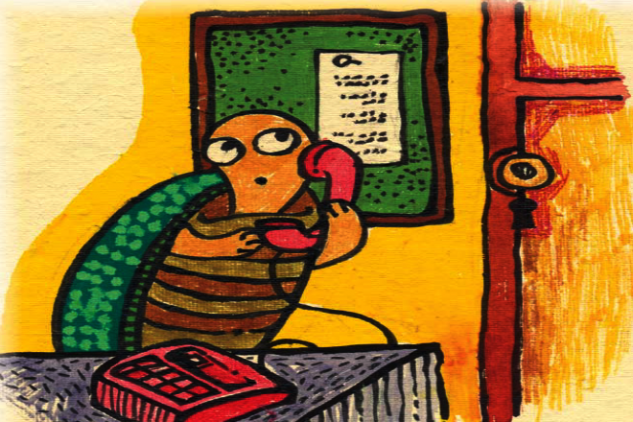
Tony ran back home and referred to the list. He called up the number for the 24×7 clinic.
“Hello! I am Tony, the tortoise speaking. My mother has high temperature and has been shivering on and off all night. I have kept a wet cloth on her forehead,” Tony said in one breath.
“Well done, Tony,” said a voice on the other end of the line. “Now calm down and tell me”
The line got cut. Tony tried the number again but he was unable to get through.
“What shall I do now? The line got cut before I could give them the address. How will they know where to come?” wondered Tony.
Tony then sat beside his mother and continued dipping the cloth in the water and placing it on his mother’s forehead.
In a short while, the doorbell rang. Tony opened the door wondering who it could be.
“Are you Tony—the one who called to inform that your mother is unwell?” asked a bear. There were also a couple of other animals with him.
“Er…yes. Who are you?” asked Tony.
“I am Dr. Bob. We are the emergency medical team from the 24×7 clinic that you called up,” said Dr. Bob.
Tony was surprised and relieved at the same time.
But how did you find out my address?” asked Tony.
“Tony, you are quite famous in our forest for your mischief. So, it was easy to find out where you live,” said Dr. Bob, winking at him. “Now, will you please take us to your mother?”’
Tony led Dr. Bob and his team to his mother. They checked her and diagnosed that she was down pneumonia.
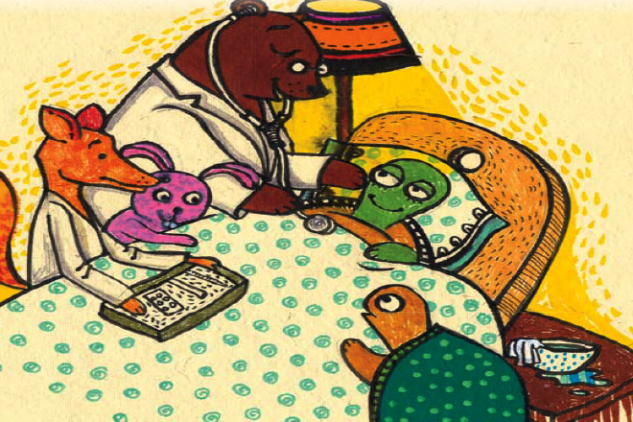
“You did a good job by keeping her temperature under control and calling us at the right time, Tony,” said Dr. Bob, patting him on his shoulder. “Her condition is not very critical. Yet, we need to take her to the hospital for treatment. She should recover in a couple of days.”
When Tony’s father heard about the incident. he appreciated Tony. “Well done, son. You have proven that you can be responsible when the situation arises,” he said.
Tony beamed with pride.
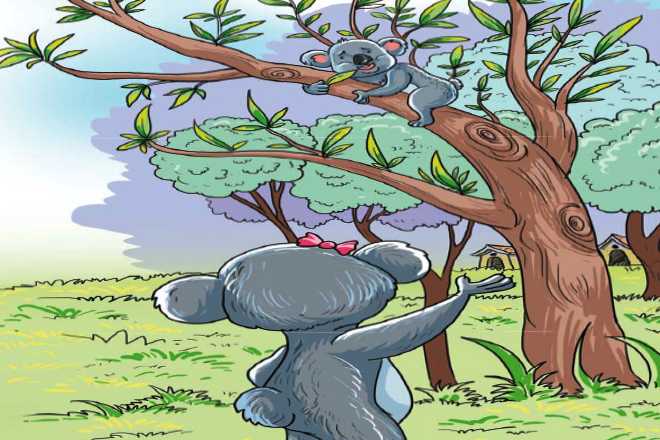
Koko, the koala was munching on delicious eucalyptus leaves when he heard his mother calling out to him.
“Koko! Please come down. We have to go out,” said his mother.
“No, Mom. I don’t want to go anywhere just now!” whined Koko. “I want to stay here and finish eating these leaves. You please go without me.”
“I want to introduce you to our new neighbour Lucy and her son. It’s important for you to know the other animals that live in the sanctuary,” said Koko’s mother.
“Mom is always giving me instructions. When will I have the freedom to do what I want?” Koko thought to himself and sulked.
“Koko! Did you hear what I just said? Come down please,” said his mother.
“Please, Mom!” Koko pleaded. “I don’t want to meet Aunt Lucy. I am terrified of her. She has strange legs! Her front is shorter to her legs at the back. And she hops so fast. That really scares me!”
“You’re being silly, Koko. Lucy is a kangaroo and kangaroos move by hopping. All animals are unique in their own way,” explained Koko’s mother. “Now hurry up! Lucy must be waiting for us.”
Koko climbed down the tree reluctantly and accompanied his mother to Lucy’s house.
“Welcome!” Lucy greeted them cheerfully at the door.
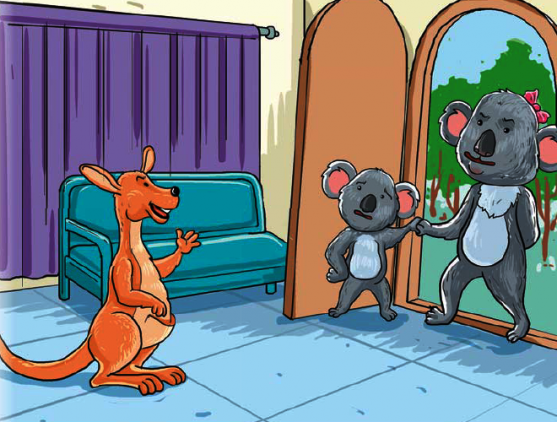
Koko walked in apprehensively. Suddenly, someone tapped Koko on his shoulder.
“Yeow!’ Koko screamed.
“Sorry! I didn’t mean to scare you,” said a young kangaroo to Koko. “I just wanted to say hello. My name is Kenny.”
“I’m K-K-Koko,” replied Koko.
“Hi, Koko!” said Kenny with a wide smile. “Would you like to play with me?”
Koko loved to play, so he immediately said yes.
“Let’s play in the park outside our house,” said Kenny, leading the way.
“Be careful, kids. Don’t go very far,” said Lucy.
“Oh come on, Mother!” said Kenny in exasperation. “You know I’m very brave. Even the wildest animals are afraid of me.”
Kenny then turned to Koko and whispered, “My mother is always telling me what to do! Anyway, come on, let’s play with my boomerang.”
“What’s a boomerang?” asked Koko.
“It’s a wooden toy that is bent and when thrown correctly, it flies right back to you,” said Kenny.
In the park, Kenny showed how to throw the boomerang
“This is how you throw it!” Kenny said, flinging the boomerang like a Frisbee. Koko watched delightedly as the boomerang soared far and flew back right into Kenny’s hand. Koko became fascinated by it.
The two took turns to throw it. Without realising, they had ventured towards the far end of the park.
Suddenly, a big, black wolf appeared before them. Kenny and Koko became scared.
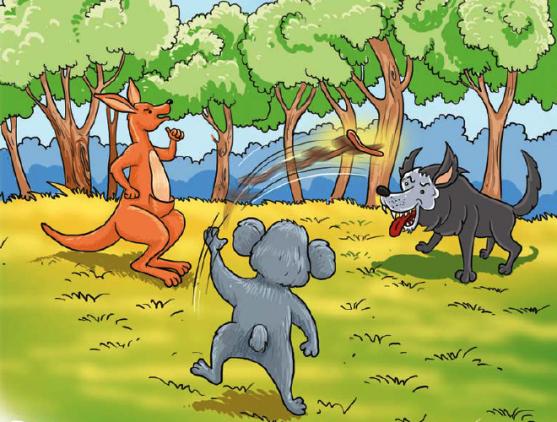
“Oh no!” Kenny trembled. “Mom! Come and get us!” he began to cry.
“Shhhh? Koko silenced him. “Please keep quiet. Otherwise, the wolf will know we are alone.”
The wolf walked towards the two, eyeing them hungrily.
“What shall we do now?” asked Kenny.
“You are the brave one! You said so yourself that the wildest of animals are afraid of you,” said Koko.
“No, no, I am not! I just say that so that my mother will let me play outside. My mother has warned me numerous times about the wolves that roam the far edge of the park and I never listened to her. Please save me, Koko,” Kenny cried. Koko thought hard and then had an idea. He picked up the boomerang and aimed it at the wolf’s head and flung it.
Thwack!
The boomerang caught the wolf unaware, hitting it right on the head. The wolf fell down unconscious.
More From Champak: The Pizza Girl
“Quick! Let’s run back home before the wolf wakes up,” Koko said.
The two ran as fast as they could. As soon as they entered Kenny’s house, they ran straight to their mothers.
“What happened?” asked Lucy.
The kids narrated how they managed to escape from the wolf.
“If it wasn’t for Koko’s quick thinking, the wolf would have eaten us up!” said Kenny.
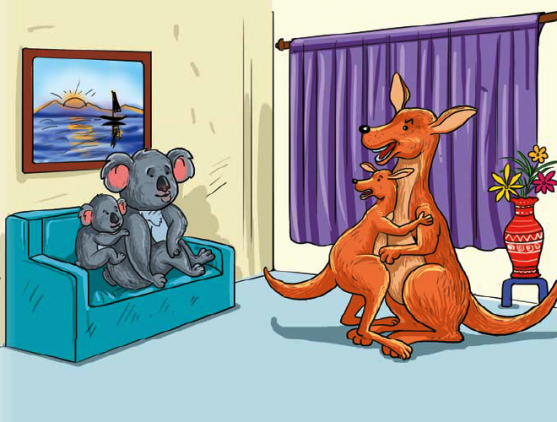
“We now realise why you keep telling us what to do and what not to do. You are concerned for our safety and have our best interests at heart,” said Koko.
The mothers were happy that the kids were safe and that they had also learnt a lesson from their experience.
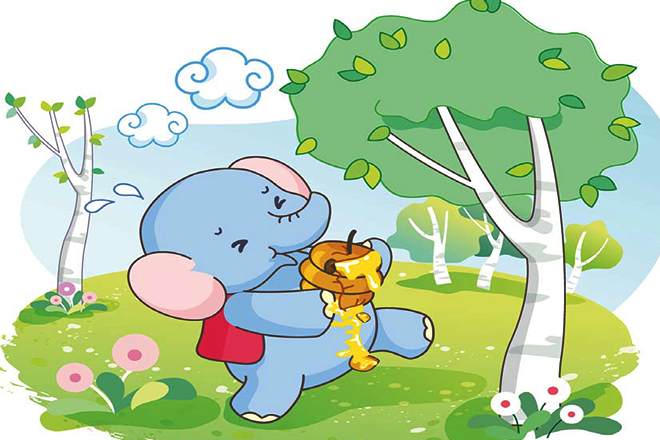
Ellie, the young elephant calf lived in the forest of Green Woods. He was much bigger and stronger than his friends, because of which he would often get into trouble unknowingly.
Once, Ellie saw a beehive on the branch of a tree. Fearing that the beehive may fall and the bees might hurt themselves, Ellie decided to help by placing the beehive down on the ground. When he tugged at the branch, he held it too tightly and broke it. The bees swarmed out of the hive angrily and scolded Ellie for being careless.
Another time, Ellie’s friends were playing football with Monty, the monkey’s new ball. In his eagerness to play, Ellie kicked the ball so hard that it burst with a loud boom! The children were angry at Ellie for ruining the ball .
After this incident, his friends started to avoid him. But Ellie Could not understand what his mistake was.
One day, when the children did not include him in their game, Ellie sat alone under a tree and started crying.
Barry, the bear, who was passing by, saw Ellie crying. He stopped to ask, “What is the matter, Ellie? Why are you crying?”
Ellie told Barry how all his friends had stopped talking to him baecause he always messed things up.
“Don’t worry, dear Ellie. The day you do a good job, everyone will realise your good intention and become your friend again,” consoled Barry.
“Thank you for the kind words,” said Ellie, feeling a little better.
The next day, as Ellie was walking by the playground, he noticed that the plants around the playground had become dry and their flowers had wilted.
“Perhaps, I should water these plants and make them bloom again. That way all my friends will notice what a good job I’ve done,” thought Ellie .
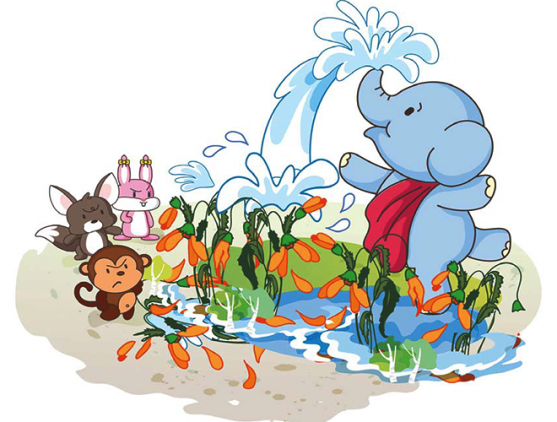
Ellie filled his trunk with water from the nearby pond and sprayed it on the plants. He did this a couple of times. But because his trunk could hold a lot of water, the plants become damaged from too much water and the ground become slushy, too.
Ellie’s friends who turned up at the playground become more angry with Ellie for not only spoiling the plants but also making the ground unsuitable for them to play in.
Three days had passed since that incident and nobody had spoken a word to Ellie. Ellie felt alone and was depressed as he still could not understand what he had done wrong.
“I watered the plants to save them from dying. Doesn’t that means I did a good job? Then, why are my friends not talking to me?” he wondered sadly.
That night, it began to rain heavily. By morning, it had rained so much that the lowlying areas of the forest were completely flooded. The animals began to panic.
It was important they crossed over to the other side of the river that had higher ground which would not get flooded easily. But it was dangerous to attempt to cross the river because of the strong current that was caused by the flood waters.
Barry asked the big animals to carry the smaller ones across the river on their back.
Ellie came forward and said, “I want to volunteer as well. I can carry my friends across the river.”
Everyone was surprised.
Barry said, “Good! We need all the help we can get. Now, follow me and we shall all cross the river together.”
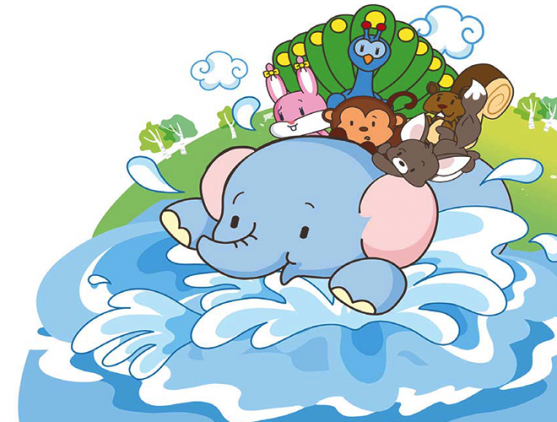
Ellie’s friends apprehensively climbed on to his back and held on to him tightly as he crossed the river.
“Thank you for bringing us across the river, Ellie,” said a grateful Monty, after they reached the other side.
“Thanks to you, we are all safe now,” said Ricky, the rabbit. Ellie brimmed with
Ellie brimmed with happiness.
“Elated!” replied Ellie.
“Good. Now, I need you to do TRISHAGNI one more thing,” said Barry. He picked up a rock and said, “ Everyone must be hungry. Can you please collect some berries using this rock?”
“But this rock is too big. The berries will be crushed,” said Ellie.
“Yes, you are right,” said Barry. “In that case, bring a jackfruit from that tree and carry it in this banana leaf.”
“Oh, barry! The banana leaf can’t take the weight of the jackfruit ! Each task has to be done a certain way,” said Ellie.
Barry smiled. “This is exactly what I was trying to make you understand. Just like that jackfruit and the rock, your strength may not be suitable for doing certain things. So, you have to careful when kicking a football and watering the plants with your trunk. But at the same time, your strength was useful in helping carry your friends across the river,” said Barry.
The realisation dawned on Ellie.“ Finally, I understand that if I don’t learn to use my strength correctly, I can damage things. From now on, I will be more careful,” he said. “Now, I have an idea on how to put my strength to good use.”
Ellie walked up to the guava tree and shook it with all his might. A bunch of fruits fell from the tree. His friends immediately picked up the fruits and ate them as they were hungry.
“You’ve done a good job, Ellie!” said Barry appreciatively.

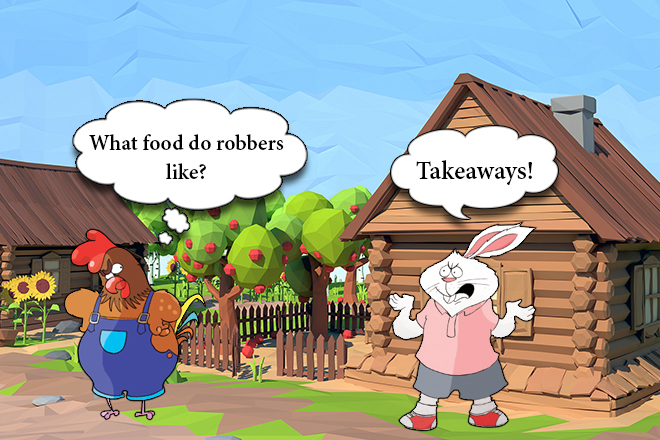
Henry Hen: What food do robbers like?
Cheeku: Takeaways!
_______________________________________________
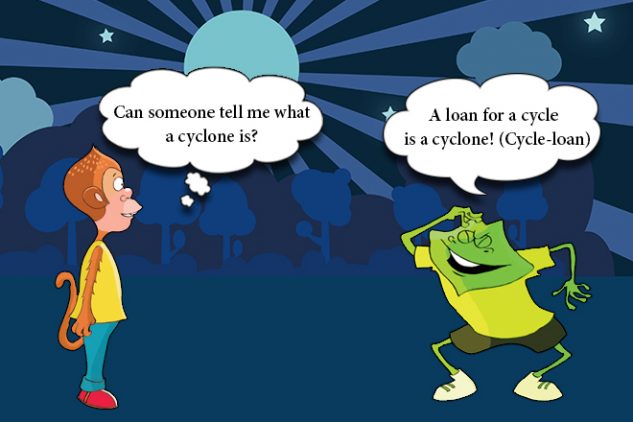
Jumpy Monkey: Can someone tell me what a cyclone is?
Ted Toad: A loan for cycle is a cyclone (Cycle-loan)

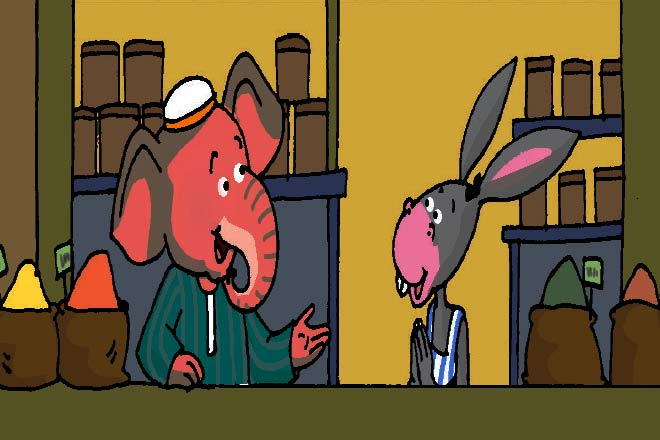

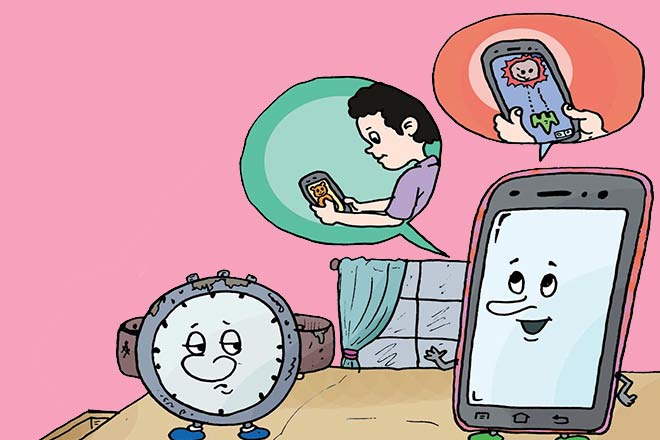
Karan came back from the shop after buying a new cover for his mobile. He placed his mobile on the table and went to his room to study. Sensing that no one was around, Karan’s wristwatch slowly peeped out of the draw. It saw the mobile admiring its new cover.
“Hello! Has Karan bought a new cover for you again?” asked the wristwatch.
“Yes! Don’t you just love the colour?” said the mobile. “And don’t be jealous that you don’t get such special treatment. It’s just that I am more useful to him than you are.”
“I was Karan’s favourite before you came into his life as a gift from his uncle. From that day on, he has forgotten all about me,” moaned the wristwatch.
“I still remember how he would tie me around his wrist and take me along wherever he went. He was so proud of me. He would even show me off to his friends,” it remembered. “But look at me now—I am covered in dust and my battery has become weak. I think I will stop working after a few days.”
“Why would Karan want you when you are not useful to him anymore?” asked the mobile phone.
“That’s not true. When Karan was younger, I was used to teaching him to tell the time. His parents and teachers pointed to me to teach him punctuality, to be on time for school and to keep up with his schedule. Through me, he learnt that time once lost cannot be regained. So, he would be very careful about how he spent his time. But why doesn’t he tie me around his wrist anymore?” wondered the watch.
“That’s because I do a lot more things for him, besides just telling the time. I can talk, take photos and give him directions to wherever he wants to go. They call me a smartphone for a reason!” boasted the mobile. “So, now that I am here, you are not needed.”
On hearing this, the watch became sad. “Perhaps, the mobile is right. Karan doesn’t need me anymore,” it thought gloomily.
A few days later, Karan’s exams began. He returned home quite upset after his first exam.
“How was the exam, Karan? Was the question paper difficult?” asked Karan’s older brother, Rajeev. brother, Rajeev.
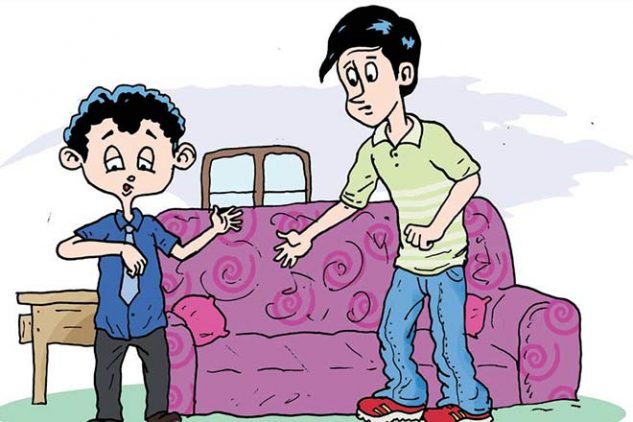
“No, it was an easy exam. I was happy when I received the question paper because I knew all the answers,” replied Karan.
“Then, why do you look upset?” asked Rajeev.
“I could not finish answering all the questions. I did not have a watch with me, so I lost out on the time I had to answer each question and plan the answers accordingly. I ended up spending a lot of time answering the first few questions. When the examiner announced that we had only 15 minutes left, I realised that I had a lot more questions to answer and could not finish it,” said Karan glumly.
“But why didn’t you wear your watch?” asked Rajeev.
“I completely forgot about the watch. Ever since I had started using the mobile, I had no use for the watch. So I guess, I eventually got out of the habit of wearing it,” said Karan.
“I agree that the mobile phone is very useful, but each gadget has its own
importance and limitation. Last week, one of my friends could not board the train because of the smartphone,” said Rajeev.
Karan was surprised. “What happened?” he asked.
“He was in the waiting room at the railway station and was playing games on his mobile. He was so engrossed that he forgot to keep track of the time and soon, the battery drained off as well and the phone switched off. Only after he asked someone for the time, he realised that he was late for his train and by the time he rushed to the platform, the train had left. He couldn’t even call anyone right away to make alternate arrangements as his phone had no battery,” said Rajeev.
“You are right, Rajeev. Mobile phones can be distracting and divert our attention from important things if we are not careful about how we use it,” agreed Karan.
More From Champak: The Greatest Treasure
“Anyway, now start preparing for your next exam and this time, take your wristwatch with you,” said Rajeev.
“Of course! First, let me quickly rush to the store and get new batteries for my watch,” said Karan.
The mobile phone and the wristwatch quietly listened to the entire conversation between Karan and his brother.
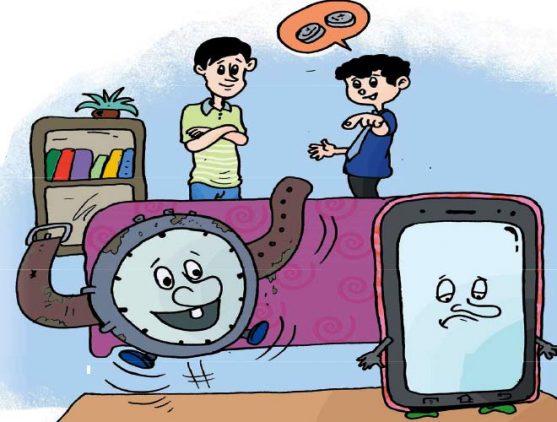
Both the watch and the mobile realised that they were important in some ways and had limitations in others. They decided to complement each other instead of fighting over who is better.

Jumbo Elephant: Where do ghosts go for a swim?
Blacky Bear: to the Dead Sea!
_________________________________________________________
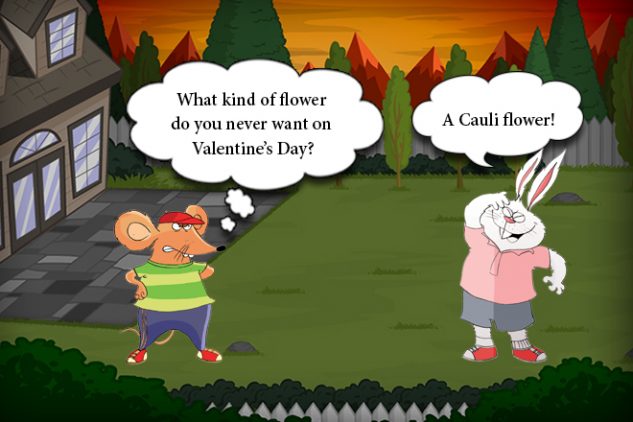
Meeku: What kind of flower do you want on Valentine’s Day?
Cheeku: A Cauli flower!
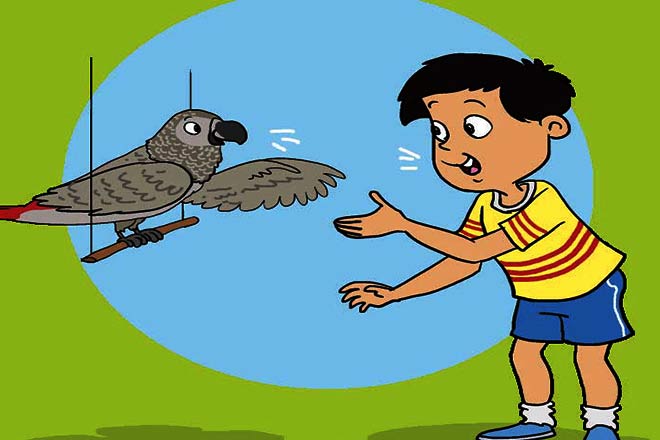
Parrots are commonly known to imitate sounds such as the barking of a dog and security alarms. Sometimes, they also repeat words. Unlike humans, parrots do not have vocal chords or lips. Parrots use a vocal organ called syrinx that controls the movement of air within the throat to produce different sounds. The syrinx can also produce two sounds at the same time. The parrot’s thick tongue aids in speech. When air passes through the syrinx, the parrot moves its tongue to produce sounds.
tongue to produce sounds. Among all species of parrots, the African grey parrot is considered to be the most intelligent and has a greater memory. Hence, it is able to learn a greater vocabulary.
The African grey parrot does not only speak human language, but it is also the only bird known to understand what it speaks. It understands what each word stands for. Cosmo, an African grey parrot, would use different phrases depending on whether the owner was in the room or not. When the owner was away, it would use phrases that established location like “I’m here”, “Where are you?”. When the owner was in the room, it would use phrases to establish interaction like “Do you want to play?”
Alex, an African grey þarrot, was trained by researchers to speak 100 words, identify 50 objects, 7 colours and 6 shapes!

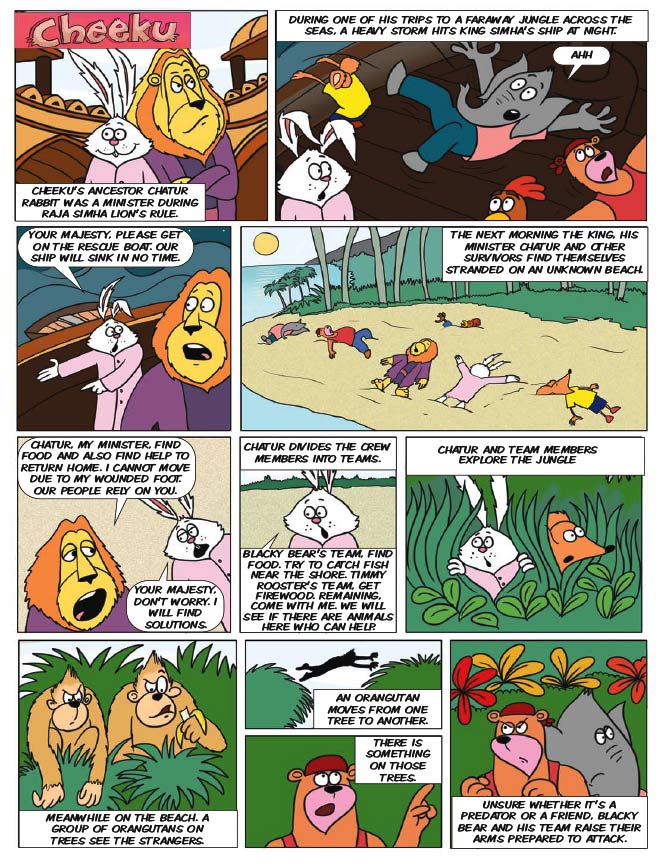
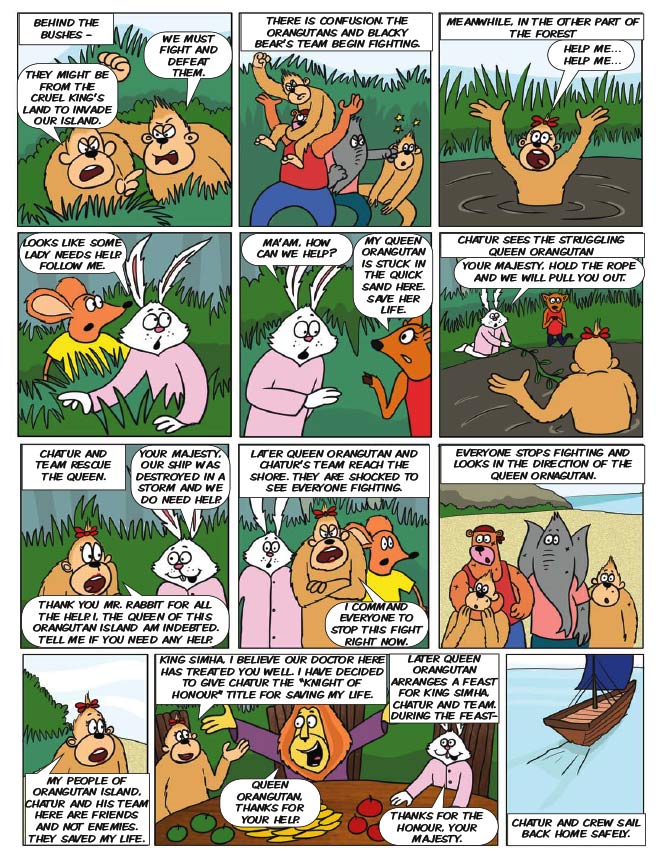
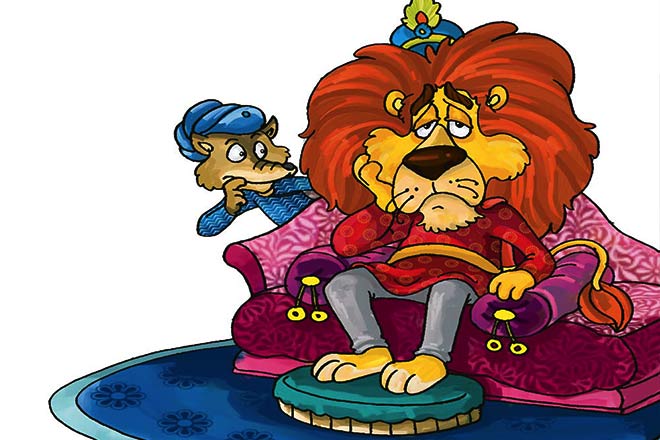
King Sher Singh was generally very cheerful. But there were days when he turned sad and irritable. This usually happened when he remembered his old friend Ramu Singh.
King Sher Singh would grow so miserable that he would even forget to eat his meals and lose interest in important matters.
“Ramu, my friend,” he would murmur in his sleep. “Where have you gone? Please come back and forgive me.” King Sher Singh would then wake up with a jolt and start crying softly
On days like that, King Sher Singh would even stop coming to his court. He would keep to himself and sometimes even neglect urgent official matters. His ministers and Queen Sherni would grow worried, for they knew that King Sher Singh couldn’t afford to neglect his kingly duties. But they couldn’t do much and they would patiently wait till he felt better.
But of late, Minister Chatur Jackal had noticed that King Sher Singh’s bouts of sadness were lasting for very long. And that, they were not only was affecting his duties as a king, but also his health.
Chatur Jackal couldn’t stop himself from going up to King Sher Singh. He was very concerned about him.
“Your Majesty,” Chatur Jackal said politely.
“I don’t mean to be inquisitive but may I ask what exactly makes you so upset sometimes? Why don’t you share your worries with me? You’ll feel much better if you do. And who knows, I might just be able to help you solve your problem.” King Sher Singh trusted Chatur Jackal and thought of him as a friend. And so, he decided to share his problem with him.
“Well, Chatur,” King Sher Singh said as a few tears rolled down his eyes. “I had a very dear friend in my childhood. His name was Ramu Singh. He was my best friend. We played games and studied together everyday. But one day, we had an argument. I lost my temper and said some very harsh things to my friend. Ramu Singh was hurt. He left the forest without telling anyone where he was going. I think of him sometimes and wonder where he went. How I wish that we were still friends.”
“Oh!” Chatur Jackal said to himself after hearing King Sher Singh’s story. “So, King Sher Singh is missing his old friend. Well, it is indeed sad. But he isn’t doing anything about it. There are many animals and birds in Champakvan who have been separated from their parents, siblings and children. I should introduce King Sher Singh to them and tell him what they do.”
Chatur Jackal then listed out the names of some of the animals who had been separated from their loved ones.
“Blacky Bear was lost when he was just a cub,” Chatur Jackal recalled as he noted the names down. “He has been looking for his parents ever since then. And Roopi Deer’s son had been kidnapped by Kalu Jackal a long time ago. She hasn’t given up hope and is still searching for him.”
Chatur Jackal then took King Sher Singh to meet Blacky Bear and Roopi Deer. After hearing their stories, King Sher Singh realised that he was not the only one who had lost someone he cared about. There were others too. But unlike him, they were working hard to find them.
King Sher Singh decided that he too would look for his long-lost friend. He then sent his soldiers to look for Ramu Singh.
“Go to all the rivers, mountains, fields, forests and lakes in the land!” he ordered. “Leave no stone unturned. You must find Ramu Singh.”
And so, the soldiers did as they were told. But they didn’t find Ramu Singh anywhere. King Sher Singh didn’t lose heart. Instead, he joined his soldiers in the search.
One day, King Sher Singh came across a rocky hill covered by trees. He noticed the marks of a lion’s paws on the ground.
“Hmm,” he wondered. “Could my long-lost friend be here?” King Sher Singh then ordered his soldiers to search the entire area thoroughly.
The soldiers soon spotted a lion sitting outside a small cave. He was dressing the wounds of some injured birds and animals. They went and told King Sher Singh about it.
King Sher Singh recalled how his friend Ramu Singh had always wanted to be a doctor. “Could that be Ramu Singh?” he said hopefully. He then ran to the cave.
King Sher Singh’s happiness knew no bounds when recognised the lion sitting there. Yes, he was his friend Ramu Singh.
“At last! There’s my long-lost friend,” he said to himself. “I can’t wait to talk to him!” King Sher Singh started to walk towards Ramu Singh. But then he hesitated and stopped mid-way. He remembered the last time they had met, and the harsh words that he had spoken. Chatur Jackal, who had accompanied King Sher Singh, understood his dilemma.
“Go on, Your Majesty!” he said and encouraged King Sher Singh to go further. “You have been waiting for this moment since very long!” King Sher Singh nodded and slowly walked towards Ramu Singh. Ramu Singh looked up and wondered who, dressed in royal attire, was coming to meet him.
When King Sher Singh came closer, Ramu Singh’s eyes twinkled. He recognised his friend immediately and jumped up and hugged King Sher Singh.
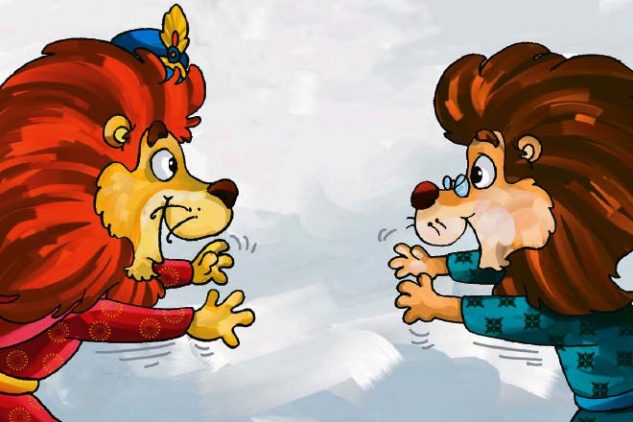
Soon, the two friends had tears in their eyes. “I wish I hadn’t been so harsh, Ramu,” King Sher Singh said. “Please forgive me.”
“And I wish I hadn’t walked away in a huff and not kept in touch,” Ramu Singh said. “I’m sorry too.” The two friends then sat together and laughed and talked happily. Chatur Jackal and the soldiers were happy to see King Sher Singh look so cheerful once again.
“Your Majesty,” Chatur Jackal told King Sher Singh later that day. “Don’t you wish that you had looked for Ramu Singh right after he left, and apologised immediately?”
“I wish I had,” King Sher Singh said. “Had I done that, I wouldn’t have felt so miserable for so many years.”
After that, King Sher Singh never felt gloomy or irritable again. He didn’t neglect his duties either. He now understood that any misunderstanding in a friendship should be sorted immediately. He stayed in touch with Ramu Singh and was careful not to lose his temper or say anything that was harsh again. He didn’t want to lose his friend again.
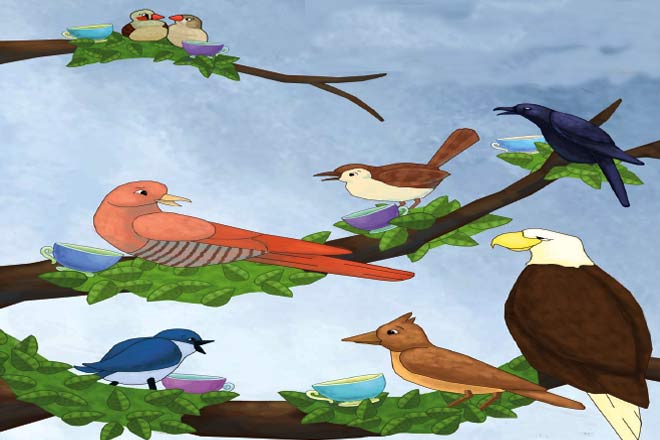
Once upon a time, long, long ago, even before humans inhabited the earth, Miss Cuckoo who loved the good life, decided to have a special tea party.
She invited all the birds she knew. She even sent fancy invitation cards to the great eagles, to the larks, the finches, the swallows and the crows. Miss Cuckoo also sent an invitation to the little brown bird that sings alone in the hedges and has no name.
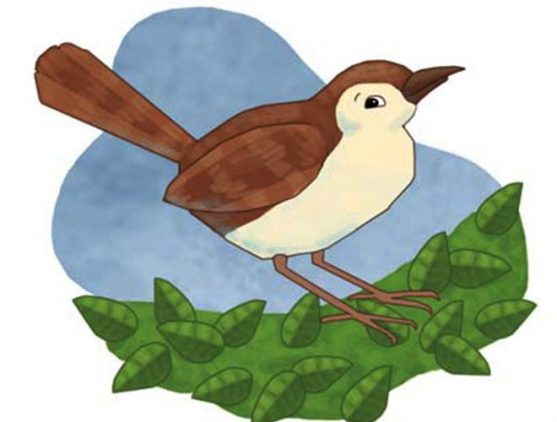
As the feathered creatures arrived, Miss Cuckoo greeted them warmly and asked them to sit around a grand old tea table. She then graciously gave them cups of sweet tea and whatever they liked to eat best. The birds wondered why Miss Cuckoo had taken so much trouble to have such a grand tea party and gather them all together. And as the saying goes to this day, they thought that she was being “as silly as a cuckoo”.
When the birds had drunk enough tea and had eaten to their heart’s content, Miss Cuckoo hopped on to the centre of the table. “Friends, listen carefully,” she said. “We birds need someone to be our King. And so, I suggest that we crown one of us as the King of Birds today, so that there’s someone to lead us all and look after everything.” The birds began to chirp and chatter. “That’s a good idea!” they said.
Then, almost each bird present at the tea party, offered to be the King, as each was sure that he had royal blood in his veins.
Soon, the birds began to argue and quarrel amongst themselves. Just then, Mr. Rooster came by with his many wives, the hens. He heard the commotion and rushed in.
When Mr. Rooster heard what the problem was, he instantly had a solution to offer.
Well, Mr. Rooster was an expert at settling disputes since he was used to solving the many quarrels that broke out amongst his many wives.
“Why don’t we have a contest?” he suggested. “We will never decide anything by arguing. We can appoint the bird who is able to fly the highest as the King of Birds!”
All the birds liked Mr. Rooster’s idea. Except for Mr. Plover. He was a small bird who lived near the water. Mr. Plover got up in a huff and walked into the woods without saying a word. In the meanwhile, the other birds got ready to prove their mettle.
They stood in a row and spread their wings wide open. They then flew with all their strength, and as high as they could, high up into the air. Mr. Lark flew higher than the other birds at first. But soon, he was beaten by Mr. Eagle who soared so high, that in no time he looked like a speck in the sky.
“Aha! So, Mr. Eagle is the King of Birds!” Miss. Cuckoo chanted joyfully.
However, the birds soon noticed that there was another speck in the sky. And it was much higher than Mr. Eagle.
They realised that it was the little brown bird that sings alone in the hedges and has no name. He had hidden himself in Mr. Eagle’s magnificent feathers and had flown with him for a while.
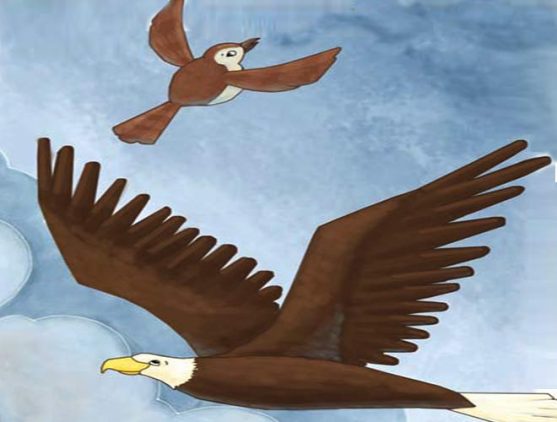
He had then broken away and flown higher all by himself. “No! I am the King of Birds!” the little brown bird twittered as he flew down and joined the others. Most of the birds objected. “You’re a tiny bird! You’re not fit to be a king!” they argued. Mr. Rooster came up with an idea once again.
“I’m sorry,” he said. “The mistake is all mine. If you don’t want this wee bird to become the King of Birds, let me give you another idea. Why don’t we make the bird who is able to fall deepest into the earth our King?”
And so, all the birds began to look about for places to jump into. Mr. Duck even tried to see how long he could hold his breath for, since he planned to jump into a pond. In the meanwhile, Mr. Rooster called out to his many wives and instructed them to dig a deep hole in the ground.
He then hid himself in the hole and crowed, “Cock-a-doodle-doo! I am the King of Birds now!” However, the little brown bird that sings in the hedges and has no name, outdid Mr. Rooster. He crept into a mouse hole and chirruped, “No, I am! I am deeper in the earth than any of you are. I am your King!”
All the birds decided that they would not acknowledge the little brown bird or let him come out of the mouse hole and claim his title. They asked Mr. Owl to sit near the opening of the mouse hole and keep a watch. All the other birds then flew home since they were tired after Miss. Cuckoo’s tea party and the contests they had participated in.
Mr. Owl stayed on and kept awake all night. He watched the mouse hole carefully and did not allow the little brown bird to even peep out. But when morning dawned, Mr. Owl found that he couldn’t keep his eyes open anymore. They simply drooped and shut. In no time, Mr. Owl fell fast asleep.
The little brown bird quietly skipped out of the mouse hole with the help of a few mice.
“Ha ha!” he chirped and laughed as he came out. “I will give myself a name now! I will call myself ‘The Little Hedge King!”
The other birds were disappointed when they found that the little bird had outsmarted them. They accused Mr. Owl of being lazy and not doing his job well.
Well, this is why Mr. Owl still sleeps in the daytime and stays awake at nights. And this is also why he watches mice and mice holes so carefully.
As for the little brown bird who sings alone in the hedges, he really made himself a king. Some people call him the wren while some others, ‘The Little Hedge King’.